
rx.Observable Maven / Gradle / Ivy
/**
* Copyright 2014 Netflix, Inc.
*
* Licensed under the Apache License, Version 2.0 (the "License"); you may not use this file except in
* compliance with the License. You may obtain a copy of the License at
*
* http://www.apache.org/licenses/LICENSE-2.0
*
* Unless required by applicable law or agreed to in writing, software distributed under the License is
* distributed on an "AS IS" BASIS, WITHOUT WARRANTIES OR CONDITIONS OF ANY KIND, either express or implied. See
* the License for the specific language governing permissions and limitations under the License.
*/
package rx;
import java.util.*;
import java.util.concurrent.*;
import rx.annotations.Beta;
import rx.annotations.Experimental;
import rx.exceptions.*;
import rx.functions.*;
import rx.internal.operators.*;
import rx.internal.util.ScalarSynchronousObservable;
import rx.internal.util.UtilityFunctions;
import rx.observables.*;
import rx.observers.SafeSubscriber;
import rx.plugins.*;
import rx.schedulers.*;
import rx.subjects.*;
import rx.subscriptions.Subscriptions;
/**
* The Observable class that implements the Reactive Pattern.
*
* This class provides methods for subscribing to the Observable as well as delegate methods to the various
* Observers.
*
* The documentation for this class makes use of marble diagrams. The following legend explains these diagrams:
*
*  *
*
* For more information see the RxJava wiki
*
* @param
* the type of the items emitted by the Observable
*/
public class Observable {
final OnSubscribe onSubscribe;
/**
* Creates an Observable with a Function to execute when it is subscribed to.
*
* Note: Use {@link #create(OnSubscribe)} to create an Observable, instead of this constructor,
* unless you specifically have a need for inheritance.
*
* @param f
* {@link OnSubscribe} to be executed when {@link #subscribe(Subscriber)} is called
*/
protected Observable(OnSubscribe f) {
this.onSubscribe = f;
}
private static final RxJavaObservableExecutionHook hook = RxJavaPlugins.getInstance().getObservableExecutionHook();
/**
* Returns an Observable that will execute the specified function when a {@link Subscriber} subscribes to
* it.
*
*  *
*
* Write the function you pass to {@code create} so that it behaves as an Observable: It should invoke the
* Subscriber's {@link Subscriber#onNext onNext}, {@link Subscriber#onError onError}, and
* {@link Subscriber#onCompleted onCompleted} methods appropriately.
*
* A well-formed Observable must invoke either the Subscriber's {@code onCompleted} method exactly once or
* its {@code onError} method exactly once.
*
* See Rx Design Guidelines (PDF) for detailed
* information.
*
* - Scheduler:
* - {@code create} does not operate by default on a particular {@link Scheduler}.
*
*
* @param
* the type of the items that this Observable emits
* @param f
* a function that accepts an {@code Subscriber}, and invokes its {@code onNext},
* {@code onError}, and {@code onCompleted} methods as appropriate
* @return an Observable that, when a {@link Subscriber} subscribes to it, will execute the specified
* function
* @see RxJava wiki: create
*/
public final static Observable create(OnSubscribe f) {
return new Observable(hook.onCreate(f));
}
/**
* Invoked when Obserable.subscribe is called.
*/
public static interface OnSubscribe extends Action1> {
// cover for generics insanity
}
/**
* Operator function for lifting into an Observable.
*/
public interface Operator extends Func1, Subscriber> {
// cover for generics insanity
}
/**
* Lifts a function to the current Observable and returns a new Observable that when subscribed to will pass
* the values of the current Observable through the Operator function.
*
* In other words, this allows chaining Observers together on an Observable for acting on the values within
* the Observable.
*
{@code
* observable.map(...).filter(...).take(5).lift(new OperatorA()).lift(new OperatorB(...)).subscribe()
* }
*
* If the operator you are creating is designed to act on the individual items emitted by a source
* Observable, use {@code lift}. If your operator is designed to transform the source Observable as a whole
* (for instance, by applying a particular set of existing RxJava operators to it) use {@link #compose}.
*
* - Scheduler:
* - {@code lift} does not operate by default on a particular {@link Scheduler}.
*
*
* @param lift the Operator that implements the Observable-operating function to be applied to the source
* Observable
* @return an Observable that is the result of applying the lifted Operator to the source Observable
* @see RxJava wiki: Implementing Your Own Operators
*/
public final Observable lift(final Operator lift) {
return new Observable(new OnSubscribe() {
@Override
public void call(Subscriber o) {
try {
Subscriber st = hook.onLift(lift).call(o);
try {
// new Subscriber created and being subscribed with so 'onStart' it
st.onStart();
onSubscribe.call(st);
} catch (Throwable e) {
// localized capture of errors rather than it skipping all operators
// and ending up in the try/catch of the subscribe method which then
// prevents onErrorResumeNext and other similar approaches to error handling
if (e instanceof OnErrorNotImplementedException) {
throw (OnErrorNotImplementedException) e;
}
st.onError(e);
}
} catch (Throwable e) {
if (e instanceof OnErrorNotImplementedException) {
throw (OnErrorNotImplementedException) e;
}
// if the lift function failed all we can do is pass the error to the final Subscriber
// as we don't have the operator available to us
o.onError(e);
}
}
});
}
/**
* Transform an Observable by applying a particular Transformer function to it.
*
* This method operates on the Observable itself whereas {@link #lift} operates on the Observable's
* Subscribers or Observers.
*
* If the operator you are creating is designed to act on the individual items emitted by a source
* Observable, use {@link #lift}. If your operator is designed to transform the source Observable as a whole
* (for instance, by applying a particular set of existing RxJava operators to it) use {@code compose}.
*
* - Scheduler:
* - {@code compose} does not operate by default on a particular {@link Scheduler}.
*
*
* @param transformer implements the function that transforms the source Observable
* @return the source Observable, transformed by the transformer function
* @see RxJava wiki: Implementing Your Own Operators
*/
@SuppressWarnings("unchecked")
public Observable compose(Transformer transformer) {
return ((Transformer) transformer).call(this);
}
/**
* Transformer function used by {@link #compose}.
* @warn more complete description needed
*/
public static interface Transformer extends Func1, Observable> {
// cover for generics insanity
}
/* *********************************************************************************************************
* Operators Below Here
* *********************************************************************************************************
*/
/**
* Mirrors the one Observable in an Iterable of several Observables that first emits an item.
*
*  *
*
* - Scheduler:
* - {@code amb} does not operate by default on a particular {@link Scheduler}.
*
*
* @param sources
* an Iterable of Observable sources competing to react first
* @return an Observable that emits the same sequence of items as whichever of the source Observables first
* emitted an item
* @see RxJava wiki: amb
*/
public final static Observable amb(Iterable> sources) {
return create(OnSubscribeAmb.amb(sources));
}
/**
* Given two Observables, mirrors the one that first emits an item.
*
*  *
*
* - Scheduler:
* - {@code amb} does not operate by default on a particular {@link Scheduler}.
*
*
* @param o1
* an Observable competing to react first
* @param o2
* an Observable competing to react first
* @return an Observable that emits the same sequence of items as whichever of the source Observables first
* emitted an item
* @see RxJava wiki: amb
*/
public final static Observable amb(Observable o1, Observable o2) {
return create(OnSubscribeAmb.amb(o1, o2));
}
/**
* Given three Observables, mirrors the one that first emits an item.
*
*  *
*
* - Scheduler:
* - {@code amb} does not operate by default on a particular {@link Scheduler}.
*
*
* @param o1
* an Observable competing to react first
* @param o2
* an Observable competing to react first
* @param o3
* an Observable competing to react first
* @return an Observable that emits the same sequence of items as whichever of the source Observables first
* emitted an item
* @see RxJava wiki: amb
*/
public final static Observable amb(Observable o1, Observable o2, Observable o3) {
return create(OnSubscribeAmb.amb(o1, o2, o3));
}
/**
* Given four Observables, mirrors the one that first emits an item.
*
*  *
*
* - Scheduler:
* - {@code amb} does not operate by default on a particular {@link Scheduler}.
*
*
* @param o1
* an Observable competing to react first
* @param o2
* an Observable competing to react first
* @param o3
* an Observable competing to react first
* @param o4
* an Observable competing to react first
* @return an Observable that emits the same sequence of items as whichever of the source Observables first
* emitted an item
* @see RxJava wiki: amb
*/
public final static Observable amb(Observable o1, Observable o2, Observable o3, Observable o4) {
return create(OnSubscribeAmb.amb(o1, o2, o3, o4));
}
/**
* Given five Observables, mirrors the one that first emits an item.
*
*  *
*
* - Scheduler:
* - {@code amb} does not operate by default on a particular {@link Scheduler}.
*
*
* @param o1
* an Observable competing to react first
* @param o2
* an Observable competing to react first
* @param o3
* an Observable competing to react first
* @param o4
* an Observable competing to react first
* @param o5
* an Observable competing to react first
* @return an Observable that emits the same sequence of items as whichever of the source Observables first
* emitted an item
* @see RxJava wiki: amb
*/
public final static Observable amb(Observable o1, Observable o2, Observable o3, Observable o4, Observable o5) {
return create(OnSubscribeAmb.amb(o1, o2, o3, o4, o5));
}
/**
* Given six Observables, mirrors the one that first emits an item.
*
*  *
*
* - Scheduler:
* - {@code amb} does not operate by default on a particular {@link Scheduler}.
*
*
* @param o1
* an Observable competing to react first
* @param o2
* an Observable competing to react first
* @param o3
* an Observable competing to react first
* @param o4
* an Observable competing to react first
* @param o5
* an Observable competing to react first
* @param o6
* an Observable competing to react first
* @return an Observable that emits the same sequence of items as whichever of the source Observables first
* emitted an item
* @see RxJava wiki: amb
*/
public final static Observable amb(Observable o1, Observable o2, Observable o3, Observable o4, Observable o5, Observable o6) {
return create(OnSubscribeAmb.amb(o1, o2, o3, o4, o5, o6));
}
/**
* Given seven Observables, mirrors the one that first emits an item.
*
*  *
*
* - Scheduler:
* - {@code amb} does not operate by default on a particular {@link Scheduler}.
*
*
* @param o1
* an Observable competing to react first
* @param o2
* an Observable competing to react first
* @param o3
* an Observable competing to react first
* @param o4
* an Observable competing to react first
* @param o5
* an Observable competing to react first
* @param o6
* an Observable competing to react first
* @param o7
* an Observable competing to react first
* @return an Observable that emits the same sequence of items as whichever of the source Observables first
* emitted an item
* @see RxJava wiki: amb
*/
public final static Observable amb(Observable o1, Observable o2, Observable o3, Observable o4, Observable o5, Observable o6, Observable o7) {
return create(OnSubscribeAmb.amb(o1, o2, o3, o4, o5, o6, o7));
}
/**
* Given eight Observables, mirrors the one that first emits an item.
*
*  *
*
* - Scheduler:
* - {@code amb} does not operate by default on a particular {@link Scheduler}.
*
*
* @param o1
* an Observable competing to react first
* @param o2
* an Observable competing to react first
* @param o3
* an Observable competing to react first
* @param o4
* an Observable competing to react first
* @param o5
* an Observable competing to react first
* @param o6
* an Observable competing to react first
* @param o7
* an Observable competing to react first
* @param o8
* an observable competing to react first
* @return an Observable that emits the same sequence of items as whichever of the source Observables first
* emitted an item
* @see RxJava wiki: amb
*/
public final static Observable amb(Observable o1, Observable o2, Observable o3, Observable o4, Observable o5, Observable o6, Observable o7, Observable o8) {
return create(OnSubscribeAmb.amb(o1, o2, o3, o4, o5, o6, o7, o8));
}
/**
* Given nine Observables, mirrors the one that first emits an item.
*
*  *
*
* - Scheduler:
* - {@code amb} does not operate by default on a particular {@link Scheduler}.
*
*
* @param o1
* an Observable competing to react first
* @param o2
* an Observable competing to react first
* @param o3
* an Observable competing to react first
* @param o4
* an Observable competing to react first
* @param o5
* an Observable competing to react first
* @param o6
* an Observable competing to react first
* @param o7
* an Observable competing to react first
* @param o8
* an Observable competing to react first
* @param o9
* an Observable competing to react first
* @return an Observable that emits the same sequence of items as whichever of the source Observables first
* emitted an item
* @see RxJava wiki: amb
*/
public final static Observable amb(Observable o1, Observable o2, Observable o3, Observable o4, Observable o5, Observable o6, Observable o7, Observable o8, Observable o9) {
return create(OnSubscribeAmb.amb(o1, o2, o3, o4, o5, o6, o7, o8, o9));
}
/**
* Combines two source Observables by emitting an item that aggregates the latest values of each of the
* source Observables each time an item is received from either of the source Observables, where this
* aggregation is defined by a specified function.
*
* 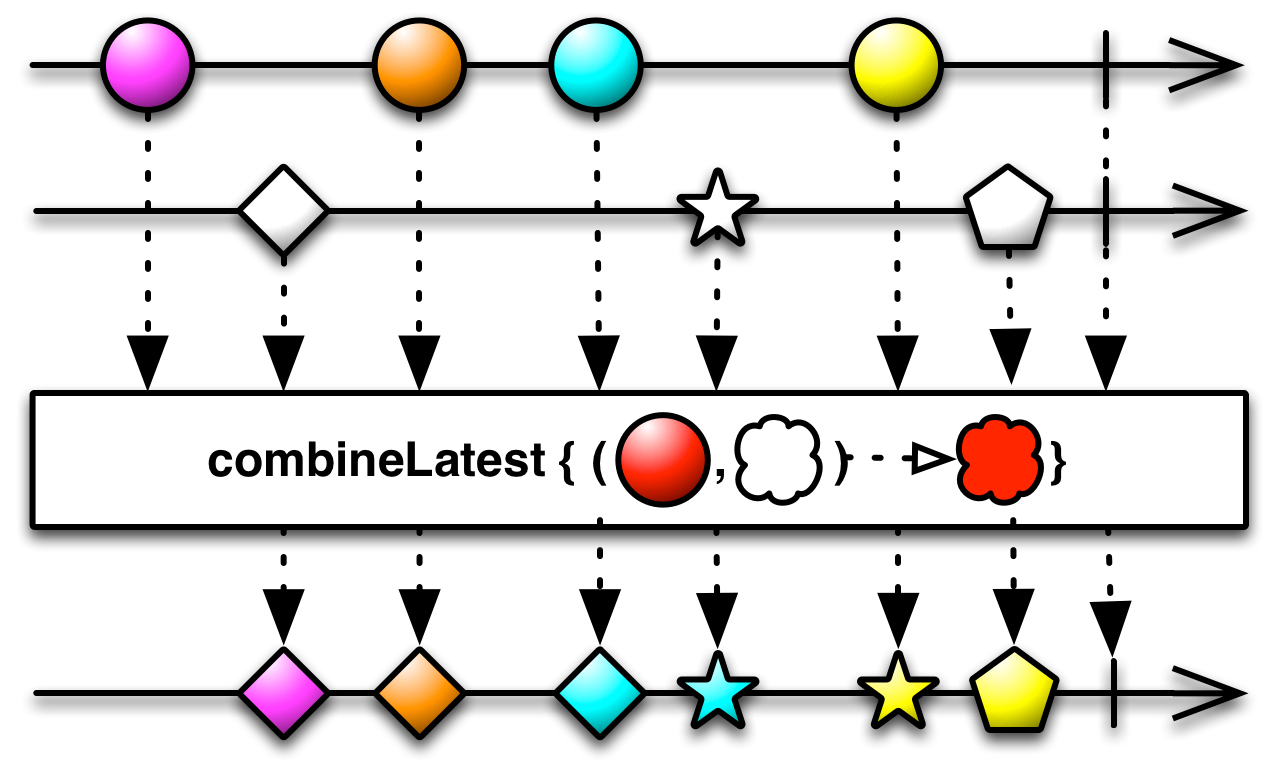 *
*
* - Scheduler:
* - {@code combineLatest} does not operate by default on a particular {@link Scheduler}.
*
*
* @param o1
* the first source Observable
* @param o2
* the second source Observable
* @param combineFunction
* the aggregation function used to combine the items emitted by the source Observables
* @return an Observable that emits items that are the result of combining the items emitted by the source
* Observables by means of the given aggregation function
* @see RxJava wiki: combineLatest
*/
@SuppressWarnings("unchecked")
public static final Observable combineLatest(Observable o1, Observable o2, Func2 combineFunction) {
return combineLatest(Arrays.asList(o1, o2), Functions.fromFunc(combineFunction));
}
/**
* Combines three source Observables by emitting an item that aggregates the latest values of each of the
* source Observables each time an item is received from any of the source Observables, where this
* aggregation is defined by a specified function.
*
*  *
*
* - Scheduler:
* - {@code combineLatest} does not operate by default on a particular {@link Scheduler}.
*
*
* @param o1
* the first source Observable
* @param o2
* the second source Observable
* @param o3
* the third source Observable
* @param combineFunction
* the aggregation function used to combine the items emitted by the source Observables
* @return an Observable that emits items that are the result of combining the items emitted by the source
* Observables by means of the given aggregation function
* @see RxJava wiki: combineLatest
*/
@SuppressWarnings("unchecked")
public static final Observable combineLatest(Observable o1, Observable o2, Observable o3, Func3 combineFunction) {
return combineLatest(Arrays.asList(o1, o2, o3), Functions.fromFunc(combineFunction));
}
/**
* Combines four source Observables by emitting an item that aggregates the latest values of each of the
* source Observables each time an item is received from any of the source Observables, where this
* aggregation is defined by a specified function.
*
*  *
*
* - Scheduler:
* - {@code combineLatest} does not operate by default on a particular {@link Scheduler}.
*
*
* @param o1
* the first source Observable
* @param o2
* the second source Observable
* @param o3
* the third source Observable
* @param o4
* the fourth source Observable
* @param combineFunction
* the aggregation function used to combine the items emitted by the source Observables
* @return an Observable that emits items that are the result of combining the items emitted by the source
* Observables by means of the given aggregation function
* @see RxJava wiki: combineLatest
*/
@SuppressWarnings("unchecked")
public static final Observable combineLatest(Observable o1, Observable o2, Observable o3, Observable o4,
Func4 combineFunction) {
return combineLatest(Arrays.asList(o1, o2, o3, o4), Functions.fromFunc(combineFunction));
}
/**
* Combines five source Observables by emitting an item that aggregates the latest values of each of the
* source Observables each time an item is received from any of the source Observables, where this
* aggregation is defined by a specified function.
*
*  *
*
* - Scheduler:
* - {@code combineLatest} does not operate by default on a particular {@link Scheduler}.
*
*
* @param o1
* the first source Observable
* @param o2
* the second source Observable
* @param o3
* the third source Observable
* @param o4
* the fourth source Observable
* @param o5
* the fifth source Observable
* @param combineFunction
* the aggregation function used to combine the items emitted by the source Observables
* @return an Observable that emits items that are the result of combining the items emitted by the source
* Observables by means of the given aggregation function
* @see RxJava wiki: combineLatest
*/
@SuppressWarnings("unchecked")
public static final Observable combineLatest(Observable o1, Observable o2, Observable o3, Observable o4, Observable o5,
Func5 combineFunction) {
return combineLatest(Arrays.asList(o1, o2, o3, o4, o5), Functions.fromFunc(combineFunction));
}
/**
* Combines six source Observables by emitting an item that aggregates the latest values of each of the
* source Observables each time an item is received from any of the source Observables, where this
* aggregation is defined by a specified function.
*
*  *
*
* - Scheduler:
* - {@code combineLatest} does not operate by default on a particular {@link Scheduler}.
*
*
* @param o1
* the first source Observable
* @param o2
* the second source Observable
* @param o3
* the third source Observable
* @param o4
* the fourth source Observable
* @param o5
* the fifth source Observable
* @param o6
* the sixth source Observable
* @param combineFunction
* the aggregation function used to combine the items emitted by the source Observables
* @return an Observable that emits items that are the result of combining the items emitted by the source
* Observables by means of the given aggregation function
* @see RxJava wiki: combineLatest
*/
@SuppressWarnings("unchecked")
public static final Observable combineLatest(Observable o1, Observable o2, Observable o3, Observable o4, Observable o5, Observable o6,
Func6 combineFunction) {
return combineLatest(Arrays.asList(o1, o2, o3, o4, o5, o6), Functions.fromFunc(combineFunction));
}
/**
* Combines seven source Observables by emitting an item that aggregates the latest values of each of the
* source Observables each time an item is received from any of the source Observables, where this
* aggregation is defined by a specified function.
*
*  *
*
* - Scheduler:
* - {@code combineLatest} does not operate by default on a particular {@link Scheduler}.
*
*
* @param o1
* the first source Observable
* @param o2
* the second source Observable
* @param o3
* the third source Observable
* @param o4
* the fourth source Observable
* @param o5
* the fifth source Observable
* @param o6
* the sixth source Observable
* @param o7
* the seventh source Observable
* @param combineFunction
* the aggregation function used to combine the items emitted by the source Observables
* @return an Observable that emits items that are the result of combining the items emitted by the source
* Observables by means of the given aggregation function
* @see RxJava wiki: combineLatest
*/
@SuppressWarnings("unchecked")
public static final Observable combineLatest(Observable o1, Observable o2, Observable o3, Observable o4, Observable o5, Observable o6, Observable o7,
Func7 combineFunction) {
return combineLatest(Arrays.asList(o1, o2, o3, o4, o5, o6, o7), Functions.fromFunc(combineFunction));
}
/**
* Combines eight source Observables by emitting an item that aggregates the latest values of each of the
* source Observables each time an item is received from any of the source Observables, where this
* aggregation is defined by a specified function.
*
*  *
*
* - Scheduler:
* - {@code combineLatest} does not operate by default on a particular {@link Scheduler}.
*
*
* @param o1
* the first source Observable
* @param o2
* the second source Observable
* @param o3
* the third source Observable
* @param o4
* the fourth source Observable
* @param o5
* the fifth source Observable
* @param o6
* the sixth source Observable
* @param o7
* the seventh source Observable
* @param o8
* the eighth source Observable
* @param combineFunction
* the aggregation function used to combine the items emitted by the source Observables
* @return an Observable that emits items that are the result of combining the items emitted by the source
* Observables by means of the given aggregation function
* @see RxJava wiki: combineLatest
*/
@SuppressWarnings("unchecked")
public static final Observable combineLatest(Observable o1, Observable o2, Observable o3, Observable o4, Observable o5, Observable o6, Observable o7, Observable o8,
Func8 combineFunction) {
return combineLatest(Arrays.asList(o1, o2, o3, o4, o5, o6, o7, o8), Functions.fromFunc(combineFunction));
}
/**
* Combines nine source Observables by emitting an item that aggregates the latest values of each of the
* source Observables each time an item is received from any of the source Observables, where this
* aggregation is defined by a specified function.
*
*  *
*
* - Scheduler:
* - {@code combineLatest} does not operate by default on a particular {@link Scheduler}.
*
*
* @param o1
* the first source Observable
* @param o2
* the second source Observable
* @param o3
* the third source Observable
* @param o4
* the fourth source Observable
* @param o5
* the fifth source Observable
* @param o6
* the sixth source Observable
* @param o7
* the seventh source Observable
* @param o8
* the eighth source Observable
* @param o9
* the ninth source Observable
* @param combineFunction
* the aggregation function used to combine the items emitted by the source Observables
* @return an Observable that emits items that are the result of combining the items emitted by the source
* Observables by means of the given aggregation function
* @see RxJava wiki: combineLatest
*/
@SuppressWarnings("unchecked")
public static final Observable combineLatest(Observable o1, Observable o2, Observable o3, Observable o4, Observable o5, Observable o6, Observable o7, Observable o8,
Observable o9,
Func9 combineFunction) {
return combineLatest(Arrays.asList(o1, o2, o3, o4, o5, o6, o7, o8, o9), Functions.fromFunc(combineFunction));
}
/**
* Combines a list of source Observables by emitting an item that aggregates the latest values of each of
* the source Observables each time an item is received from any of the source Observables, where this
* aggregation is defined by a specified function.
*
* - Scheduler:
* - {@code combineLatest} does not operate by default on a particular {@link Scheduler}.
*
*
* @param
* the common base type of source values
* @param
* the result type
* @param sources
* the list of source Observables
* @param combineFunction
* the aggregation function used to combine the items emitted by the source Observables
* @return an Observable that emits items that are the result of combining the items emitted by the source
* Observables by means of the given aggregation function
* @see RxJava wiki: combineLatest
*/
public static final Observable combineLatest(List> sources, FuncN combineFunction) {
return create(new OnSubscribeCombineLatest(sources, combineFunction));
}
/**
* Returns an Observable that emits the items emitted by each of the Observables emitted by the source
* Observable, one after the other, without interleaving them.
*
* 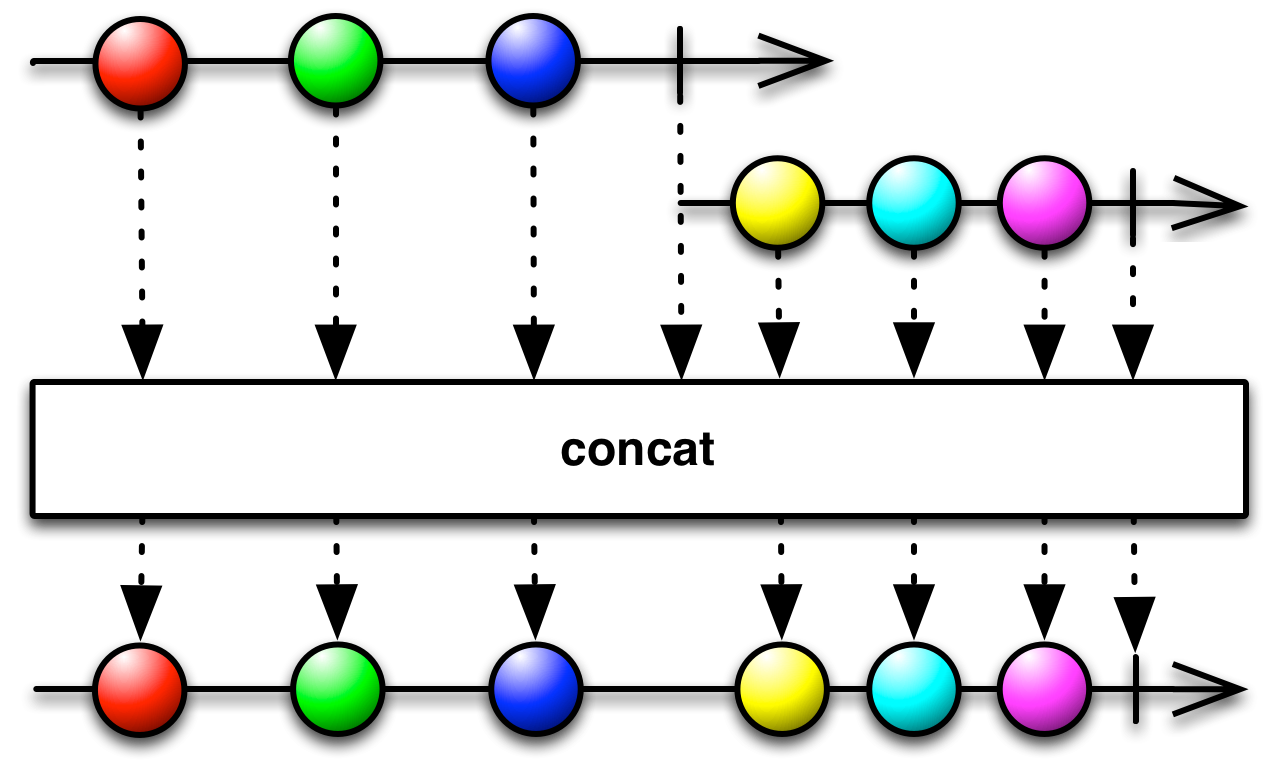 *
*
* - Scheduler:
* - {@code concat} does not operate by default on a particular {@link Scheduler}.
*
*
* @param observables
* an Observable that emits Observables
* @return an Observable that emits items all of the items emitted by the Observables emitted by
* {@code observables}, one after the other, without interleaving them
* @see RxJava wiki: concat
*/
public final static Observable concat(Observable> observables) {
return observables.lift(new OperatorConcat());
}
/**
* Returns an Observable that emits the items emitted by two Observables, one after the other, without
* interleaving them.
*
*  *
*
* - Scheduler:
* - {@code concat} does not operate by default on a particular {@link Scheduler}.
*
*
* @param t1
* an Observable to be concatenated
* @param t2
* an Observable to be concatenated
* @return an Observable that emits items emitted by the two source Observables, one after the other,
* without interleaving them
* @see RxJava wiki: concat
*/
public final static Observable concat(Observable t1, Observable t2) {
return concat(just(t1, t2));
}
/**
* Returns an Observable that emits the items emitted by three Observables, one after the other, without
* interleaving them.
*
*  *
*
* - Scheduler:
* - {@code concat} does not operate by default on a particular {@link Scheduler}.
*
*
* @param t1
* an Observable to be concatenated
* @param t2
* an Observable to be concatenated
* @param t3
* an Observable to be concatenated
* @return an Observable that emits items emitted by the three source Observables, one after the other,
* without interleaving them
* @see RxJava wiki: concat
*/
public final static Observable concat(Observable t1, Observable t2, Observable t3) {
return concat(just(t1, t2, t3));
}
/**
* Returns an Observable that emits the items emitted by four Observables, one after the other, without
* interleaving them.
*
*  *
*
* - Scheduler:
* - {@code concat} does not operate by default on a particular {@link Scheduler}.
*
*
* @param t1
* an Observable to be concatenated
* @param t2
* an Observable to be concatenated
* @param t3
* an Observable to be concatenated
* @param t4
* an Observable to be concatenated
* @return an Observable that emits items emitted by the four source Observables, one after the other,
* without interleaving them
* @see RxJava wiki: concat
*/
public final static Observable concat(Observable t1, Observable t2, Observable t3, Observable t4) {
return concat(just(t1, t2, t3, t4));
}
/**
* Returns an Observable that emits the items emitted by five Observables, one after the other, without
* interleaving them.
*
*  *
*
* - Scheduler:
* - {@code concat} does not operate by default on a particular {@link Scheduler}.
*
*
* @param t1
* an Observable to be concatenated
* @param t2
* an Observable to be concatenated
* @param t3
* an Observable to be concatenated
* @param t4
* an Observable to be concatenated
* @param t5
* an Observable to be concatenated
* @return an Observable that emits items emitted by the five source Observables, one after the other,
* without interleaving them
* @see RxJava wiki: concat
*/
public final static Observable concat(Observable t1, Observable t2, Observable t3, Observable t4, Observable t5) {
return concat(just(t1, t2, t3, t4, t5));
}
/**
* Returns an Observable that emits the items emitted by six Observables, one after the other, without
* interleaving them.
*
*  *
*
* - Scheduler:
* - {@code concat} does not operate by default on a particular {@link Scheduler}.
*
*
* @param t1
* an Observable to be concatenated
* @param t2
* an Observable to be concatenated
* @param t3
* an Observable to be concatenated
* @param t4
* an Observable to be concatenated
* @param t5
* an Observable to be concatenated
* @param t6
* an Observable to be concatenated
* @return an Observable that emits items emitted by the six source Observables, one after the other,
* without interleaving them
* @see RxJava wiki: concat
*/
public final static Observable concat(Observable t1, Observable t2, Observable t3, Observable t4, Observable t5, Observable t6) {
return concat(just(t1, t2, t3, t4, t5, t6));
}
/**
* Returns an Observable that emits the items emitted by seven Observables, one after the other, without
* interleaving them.
*
*  *
*
* - Scheduler:
* - {@code concat} does not operate by default on a particular {@link Scheduler}.
*
*
* @param t1
* an Observable to be concatenated
* @param t2
* an Observable to be concatenated
* @param t3
* an Observable to be concatenated
* @param t4
* an Observable to be concatenated
* @param t5
* an Observable to be concatenated
* @param t6
* an Observable to be concatenated
* @param t7
* an Observable to be concatenated
* @return an Observable that emits items emitted by the seven source Observables, one after the other,
* without interleaving them
* @see RxJava wiki: concat
*/
public final static Observable concat(Observable t1, Observable t2, Observable t3, Observable t4, Observable t5, Observable t6, Observable t7) {
return concat(just(t1, t2, t3, t4, t5, t6, t7));
}
/**
* Returns an Observable that emits the items emitted by eight Observables, one after the other, without
* interleaving them.
*
*  *
*
* - Scheduler:
* - {@code concat} does not operate by default on a particular {@link Scheduler}.
*
*
* @param t1
* an Observable to be concatenated
* @param t2
* an Observable to be concatenated
* @param t3
* an Observable to be concatenated
* @param t4
* an Observable to be concatenated
* @param t5
* an Observable to be concatenated
* @param t6
* an Observable to be concatenated
* @param t7
* an Observable to be concatenated
* @param t8
* an Observable to be concatenated
* @return an Observable that emits items emitted by the eight source Observables, one after the other,
* without interleaving them
* @see RxJava wiki: concat
*/
public final static Observable concat(Observable t1, Observable t2, Observable t3, Observable t4, Observable t5, Observable t6, Observable t7, Observable t8) {
return concat(just(t1, t2, t3, t4, t5, t6, t7, t8));
}
/**
* Returns an Observable that emits the items emitted by nine Observables, one after the other, without
* interleaving them.
*
*  *
*
* - Scheduler:
* - {@code concat} does not operate by default on a particular {@link Scheduler}.
*
*
* @param t1
* an Observable to be concatenated
* @param t2
* an Observable to be concatenated
* @param t3
* an Observable to be concatenated
* @param t4
* an Observable to be concatenated
* @param t5
* an Observable to be concatenated
* @param t6
* an Observable to be concatenated
* @param t7
* an Observable to be concatenated
* @param t8
* an Observable to be concatenated
* @param t9
* an Observable to be concatenated
* @return an Observable that emits items emitted by the nine source Observables, one after the other,
* without interleaving them
* @see RxJava wiki: concat
*/
public final static Observable concat(Observable t1, Observable t2, Observable t3, Observable t4, Observable t5, Observable t6, Observable t7, Observable t8, Observable t9) {
return concat(just(t1, t2, t3, t4, t5, t6, t7, t8, t9));
}
/**
* Returns an Observable that calls an Observable factory to create an Observable for each new Observer
* that subscribes. That is, for each subscriber, the actual Observable that subscriber observes is
* determined by the factory function.
*
* 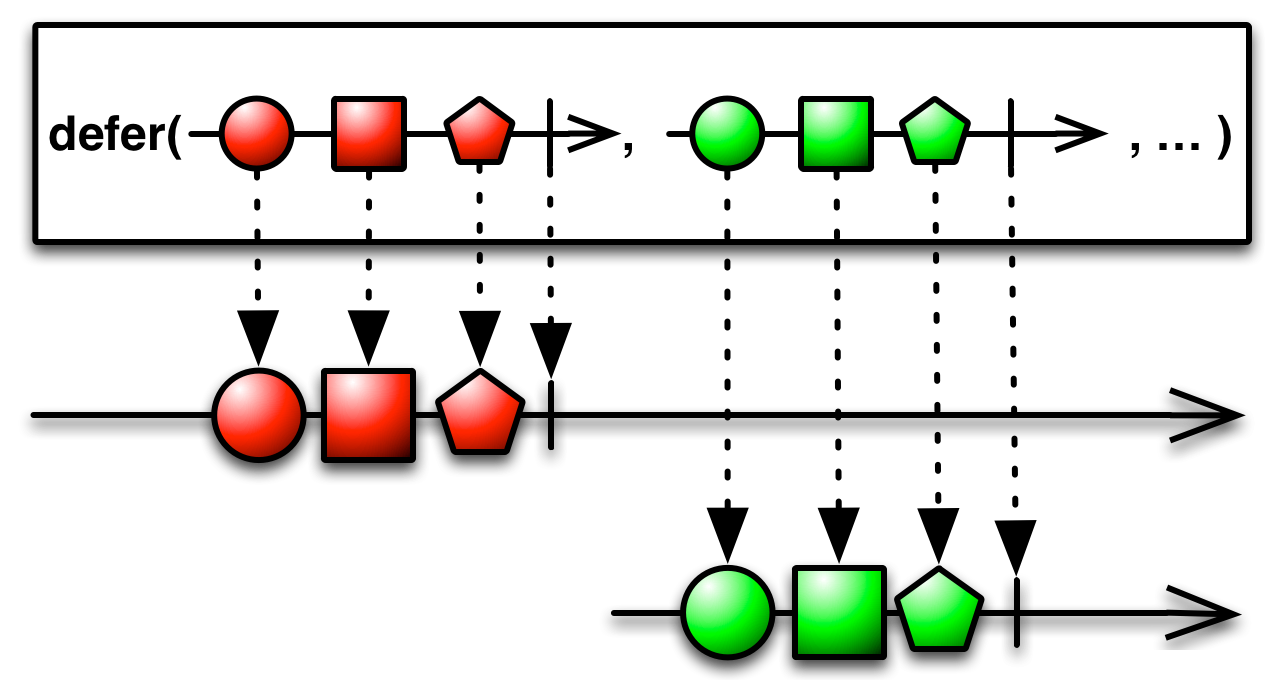 *
*
* The defer Observer allows you to defer or delay emitting items from an Observable until such time as an
* Observer subscribes to the Observable. This allows an {@link Observer} to easily obtain updates or a
* refreshed version of the sequence.
*
* - Scheduler:
* - {@code defer} does not operate by default on a particular {@link Scheduler}.
*
*
* @param observableFactory
* the Observable factory function to invoke for each {@link Observer} that subscribes to the
* resulting Observable
* @param
* the type of the items emitted by the Observable
* @return an Observable whose {@link Observer}s' subscriptions trigger an invocation of the given
* Observable factory function
* @see RxJava wiki: defer
*/
public final static Observable defer(Func0> observableFactory) {
return create(new OnSubscribeDefer(observableFactory));
}
/**
* Returns an Observable that emits no items to the {@link Observer} and immediately invokes its
* {@link Observer#onCompleted onCompleted} method.
*
*  *
*
* - Scheduler:
* - {@code empty} does not operate by default on a particular {@link Scheduler}.
*
*
* @param
* the type of the items (ostensibly) emitted by the Observable
* @return an Observable that emits no items to the {@link Observer} but immediately invokes the
* {@link Observer}'s {@link Observer#onCompleted() onCompleted} method
* @see RxJava wiki: empty
*/
public final static Observable empty() {
return from(Collections.emptyList());
}
/**
* Returns an Observable that invokes an {@link Observer}'s {@link Observer#onError onError} method when the
* Observer subscribes to it.
*
*  *
*
* - Scheduler:
* - {@code error} does not operate by default on a particular {@link Scheduler}.
*
*
* @param exception
* the particular Throwable to pass to {@link Observer#onError onError}
* @param
* the type of the items (ostensibly) emitted by the Observable
* @return an Observable that invokes the {@link Observer}'s {@link Observer#onError onError} method when
* the Observer subscribes to it
* @see RxJava wiki: error
*/
public final static Observable error(Throwable exception) {
return new ThrowObservable(exception);
}
/**
* Converts a {@link Future} into an Observable.
*
* 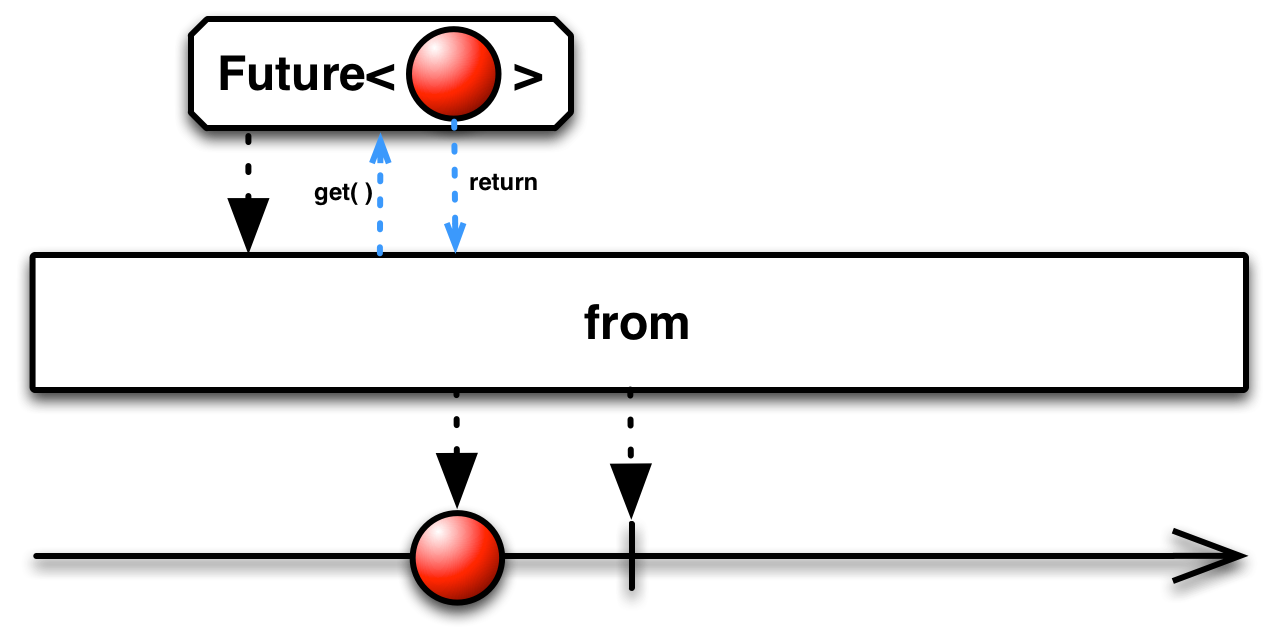 *
*
* You can convert any object that supports the {@link Future} interface into an Observable that emits the
* return value of the {@link Future#get} method of that object, by passing the object into the {@code from}
* method.
*
* Important note: This Observable is blocking; you cannot unsubscribe from it.
*
* - Scheduler:
* - {@code from} does not operate by default on a particular {@link Scheduler}.
*
*
* @param future
* the source {@link Future}
* @param
* the type of object that the {@link Future} returns, and also the type of item to be emitted by
* the resulting Observable
* @return an Observable that emits the item from the source {@link Future}
* @see RxJava wiki: from
*/
public final static Observable from(Future future) {
return create(OnSubscribeToObservableFuture.toObservableFuture(future));
}
/**
* Converts a {@link Future} into an Observable, with a timeout on the Future.
*
*  *
*
* You can convert any object that supports the {@link Future} interface into an Observable that emits the
* return value of the {@link Future#get} method of that object, by passing the object into the {@code from}
* method.
*
* Important note: This Observable is blocking; you cannot unsubscribe from it.
*
* - Scheduler:
* - {@code from} does not operate by default on a particular {@link Scheduler}.
*
*
* @param future
* the source {@link Future}
* @param timeout
* the maximum time to wait before calling {@code get}
* @param unit
* the {@link TimeUnit} of the {@code timeout} argument
* @param
* the type of object that the {@link Future} returns, and also the type of item to be emitted by
* the resulting Observable
* @return an Observable that emits the item from the source {@link Future}
* @see RxJava wiki: from
*/
public final static Observable from(Future future, long timeout, TimeUnit unit) {
return create(OnSubscribeToObservableFuture.toObservableFuture(future, timeout, unit));
}
/**
* Converts a {@link Future}, operating on a specified {@link Scheduler}, into an Observable.
*
* 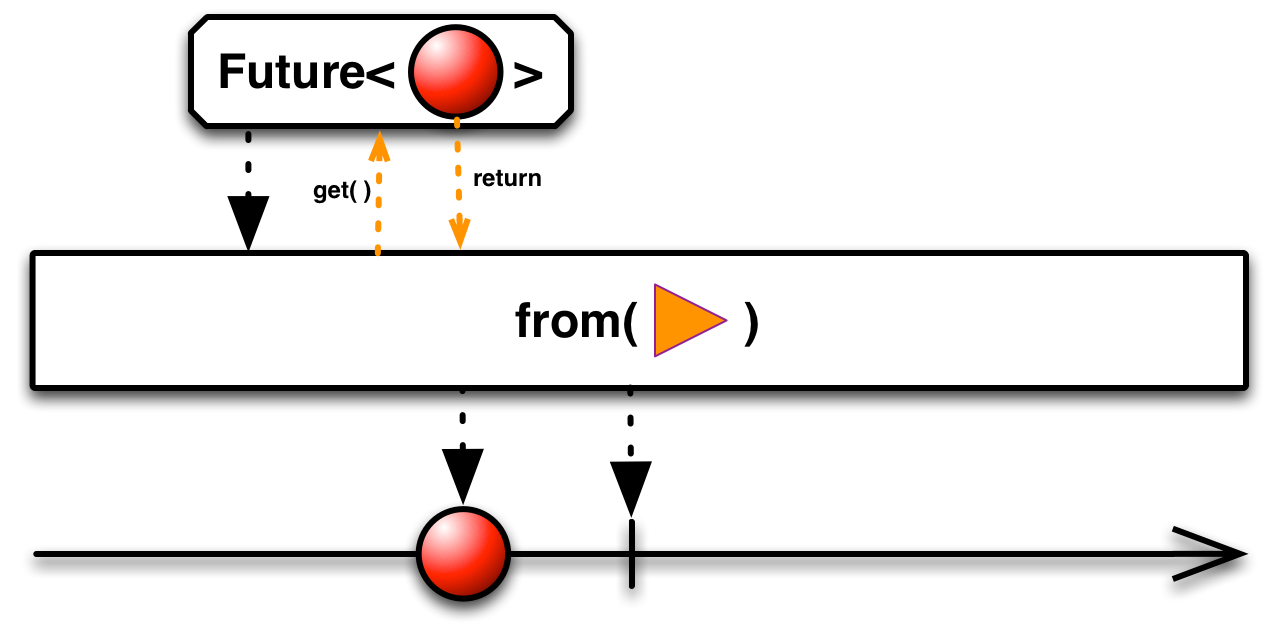 *
*
* You can convert any object that supports the {@link Future} interface into an Observable that emits the
* return value of the {@link Future#get} method of that object, by passing the object into the {@code from}
* method.
*
* - Scheduler:
* - you specify which {@link Scheduler} this operator will use
*
*
* @param future
* the source {@link Future}
* @param scheduler
* the {@link Scheduler} to wait for the Future on. Use a Scheduler such as
* {@link Schedulers#io()} that can block and wait on the Future
* @param
* the type of object that the {@link Future} returns, and also the type of item to be emitted by
* the resulting Observable
* @return an Observable that emits the item from the source {@link Future}
* @see RxJava wiki: from
*/
public final static Observable from(Future future, Scheduler scheduler) {
// TODO in a future revision the Scheduler will become important because we'll start polling instead of blocking on the Future
return create(OnSubscribeToObservableFuture.toObservableFuture(future)).subscribeOn(scheduler);
}
/**
* Converts an {@link Iterable} sequence into an Observable that emits the items in the sequence.
*
* 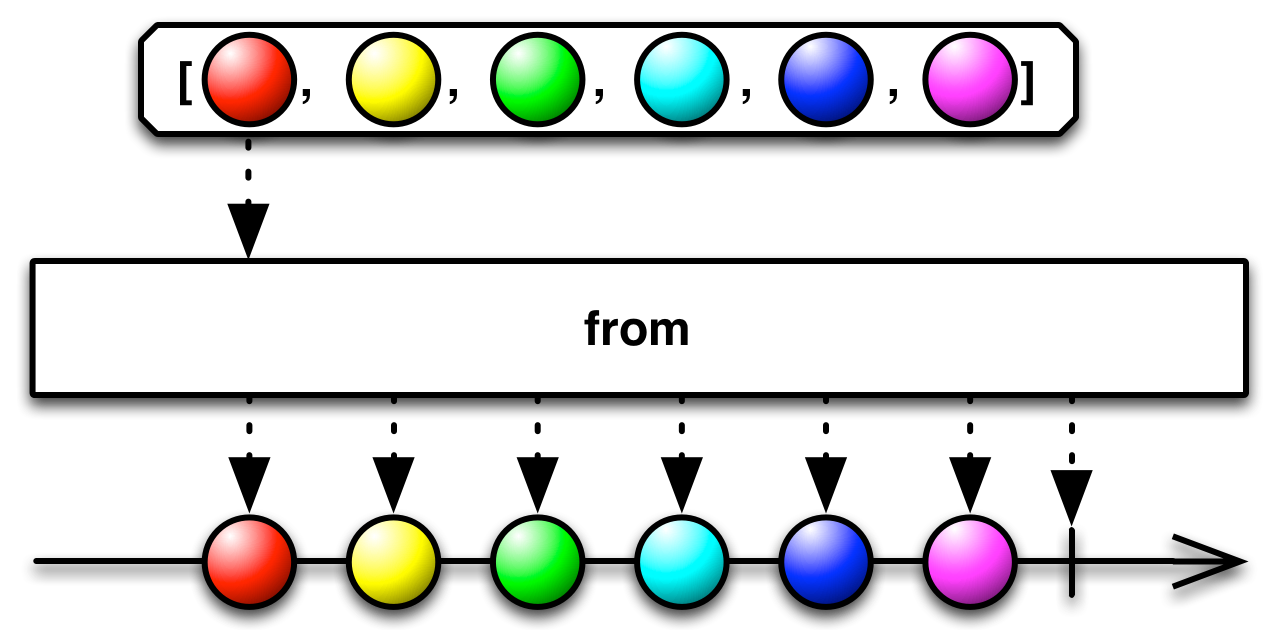 *
*
* - Scheduler:
* - {@code from} does not operate by default on a particular {@link Scheduler}.
*
*
* @param iterable
* the source {@link Iterable} sequence
* @param
* the type of items in the {@link Iterable} sequence and the type of items to be emitted by the
* resulting Observable
* @return an Observable that emits each item in the source {@link Iterable} sequence
* @see RxJava wiki: from
*/
public final static Observable from(Iterable iterable) {
return create(new OnSubscribeFromIterable(iterable));
}
/**
* Converts an Array into an Observable that emits the items in the Array.
*
*  *
*
* - Scheduler:
* - {@code from} does not operate by default on a particular {@link Scheduler}.
*
*
* @param array
* the source Array
* @param
* the type of items in the Array and the type of items to be emitted by the resulting Observable
* @return an Observable that emits each item in the source Array
* @see RxJava wiki: from
*/
public final static Observable from(T[] array) {
return from(Arrays.asList(array));
}
/**
* Returns an Observable that emits a sequential number every specified interval of time.
*
*  *
*
* - Scheduler:
* - {@code interval} operates by default on the {@code computation} {@link Scheduler}.
*
*
* @param interval
* interval size in time units (see below)
* @param unit
* time units to use for the interval size
* @return an Observable that emits a sequential number each time interval
* @see RxJava wiki: interval
*/
public final static Observable interval(long interval, TimeUnit unit) {
return interval(interval, unit, Schedulers.computation());
}
/**
* Returns an Observable that emits a sequential number every specified interval of time, on a
* specified Scheduler.
*
*  *
*
* - Scheduler:
* - you specify which {@link Scheduler} this operator will use
*
*
* @param interval
* interval size in time units (see below)
* @param unit
* time units to use for the interval size
* @param scheduler
* the Scheduler to use for scheduling the items
* @return an Observable that emits a sequential number each time interval
* @see RxJava wiki: interval
*/
public final static Observable interval(long interval, TimeUnit unit, Scheduler scheduler) {
return create(new OnSubscribeTimerPeriodically(interval, interval, unit, scheduler));
}
/**
* Returns an Observable that emits a single item and then completes.
*
*  *
*
* To convert any object into an Observable that emits that object, pass that object into the {@code just}
* method.
*
* This is similar to the {@link #from(java.lang.Object[])} method, except that {@code from} will convert
* an {@link Iterable} object into an Observable that emits each of the items in the Iterable, one at a
* time, while the {@code just} method converts an Iterable into an Observable that emits the entire
* Iterable as a single item.
*
* - Scheduler:
* - {@code just} does not operate by default on a particular {@link Scheduler}.
*
*
* @param value
* the item to emit
* @param
* the type of that item
* @return an Observable that emits {@code value} as a single item and then completes
* @see RxJava wiki: just
*/
public final static Observable just(final T value) {
return ScalarSynchronousObservable.create(value);
}
/**
* Converts two items into an Observable that emits those items.
*
* 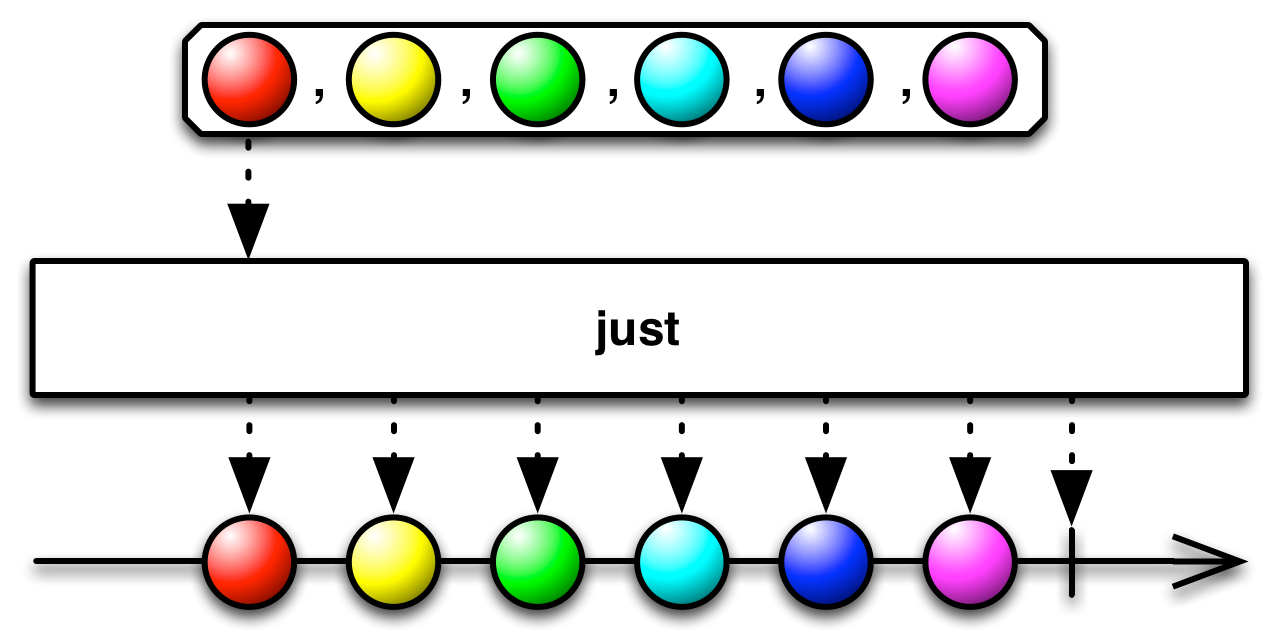 *
*
* - Scheduler:
* - {@code just} does not operate by default on a particular {@link Scheduler}.
*
*
* @param t1
* first item
* @param t2
* second item
* @param
* the type of these items
* @return an Observable that emits each item
* @see RxJava wiki: just
*/
// suppress unchecked because we are using varargs inside the method
@SuppressWarnings("unchecked")
public final static Observable just(T t1, T t2) {
return from(Arrays.asList(t1, t2));
}
/**
* Converts three items into an Observable that emits those items.
*
*  *
*
* - Scheduler:
* - {@code just} does not operate by default on a particular {@link Scheduler}.
*
*
* @param t1
* first item
* @param t2
* second item
* @param t3
* third item
* @param
* the type of these items
* @return an Observable that emits each item
* @see RxJava wiki: just
*/
// suppress unchecked because we are using varargs inside the method
@SuppressWarnings("unchecked")
public final static Observable just(T t1, T t2, T t3) {
return from(Arrays.asList(t1, t2, t3));
}
/**
* Converts four items into an Observable that emits those items.
*
*  *
*
* - Scheduler:
* - {@code just} does not operate by default on a particular {@link Scheduler}.
*
*
* @param t1
* first item
* @param t2
* second item
* @param t3
* third item
* @param t4
* fourth item
* @param
* the type of these items
* @return an Observable that emits each item
* @see RxJava wiki: just
*/
// suppress unchecked because we are using varargs inside the method
@SuppressWarnings("unchecked")
public final static Observable just(T t1, T t2, T t3, T t4) {
return from(Arrays.asList(t1, t2, t3, t4));
}
/**
* Converts five items into an Observable that emits those items.
*
*  *
*
* - Scheduler:
* - {@code just} does not operate by default on a particular {@link Scheduler}.
*
*
* @param t1
* first item
* @param t2
* second item
* @param t3
* third item
* @param t4
* fourth item
* @param t5
* fifth item
* @param
* the type of these items
* @return an Observable that emits each item
* @see RxJava wiki: just
*/
// suppress unchecked because we are using varargs inside the method
@SuppressWarnings("unchecked")
public final static Observable just(T t1, T t2, T t3, T t4, T t5) {
return from(Arrays.asList(t1, t2, t3, t4, t5));
}
/**
* Converts six items into an Observable that emits those items.
*
*  *
*
* - Scheduler:
* - {@code just} does not operate by default on a particular {@link Scheduler}.
*
*
* @param t1
* first item
* @param t2
* second item
* @param t3
* third item
* @param t4
* fourth item
* @param t5
* fifth item
* @param t6
* sixth item
* @param
* the type of these items
* @return an Observable that emits each item
* @see RxJava wiki: just
*/
// suppress unchecked because we are using varargs inside the method
@SuppressWarnings("unchecked")
public final static Observable just(T t1, T t2, T t3, T t4, T t5, T t6) {
return from(Arrays.asList(t1, t2, t3, t4, t5, t6));
}
/**
* Converts seven items into an Observable that emits those items.
*
*  *
*
* - Scheduler:
* - {@code just} does not operate by default on a particular {@link Scheduler}.
*
*
* @param t1
* first item
* @param t2
* second item
* @param t3
* third item
* @param t4
* fourth item
* @param t5
* fifth item
* @param t6
* sixth item
* @param t7
* seventh item
* @param
* the type of these items
* @return an Observable that emits each item
* @see RxJava wiki: just
*/
// suppress unchecked because we are using varargs inside the method
@SuppressWarnings("unchecked")
public final static Observable just(T t1, T t2, T t3, T t4, T t5, T t6, T t7) {
return from(Arrays.asList(t1, t2, t3, t4, t5, t6, t7));
}
/**
* Converts eight items into an Observable that emits those items.
*
*  *
*
* - Scheduler:
* - {@code just} does not operate by default on a particular {@link Scheduler}.
*
*
* @param t1
* first item
* @param t2
* second item
* @param t3
* third item
* @param t4
* fourth item
* @param t5
* fifth item
* @param t6
* sixth item
* @param t7
* seventh item
* @param t8
* eighth item
* @param
* the type of these items
* @return an Observable that emits each item
* @see RxJava wiki: just
*/
// suppress unchecked because we are using varargs inside the method
@SuppressWarnings("unchecked")
public final static Observable just(T t1, T t2, T t3, T t4, T t5, T t6, T t7, T t8) {
return from(Arrays.asList(t1, t2, t3, t4, t5, t6, t7, t8));
}
/**
* Converts nine items into an Observable that emits those items.
*
*  *
*
* - Scheduler:
* - {@code just} does not operate by default on a particular {@link Scheduler}.
*
*
* @param t1
* first item
* @param t2
* second item
* @param t3
* third item
* @param t4
* fourth item
* @param t5
* fifth item
* @param t6
* sixth item
* @param t7
* seventh item
* @param t8
* eighth item
* @param t9
* ninth item
* @param
* the type of these items
* @return an Observable that emits each item
* @see RxJava wiki: just
*/
// suppress unchecked because we are using varargs inside the method
@SuppressWarnings("unchecked")
public final static Observable just(T t1, T t2, T t3, T t4, T t5, T t6, T t7, T t8, T t9) {
return from(Arrays.asList(t1, t2, t3, t4, t5, t6, t7, t8, t9));
}
/**
* Converts ten items into an Observable that emits those items.
*
*  *
*
* - Scheduler:
* - {@code just} does not operate by default on a particular {@link Scheduler}.
*
*
* @param t1
* first item
* @param t2
* second item
* @param t3
* third item
* @param t4
* fourth item
* @param t5
* fifth item
* @param t6
* sixth item
* @param t7
* seventh item
* @param t8
* eighth item
* @param t9
* ninth item
* @param t10
* tenth item
* @param
* the type of these items
* @return an Observable that emits each item
* @see RxJava wiki: just
*/
// suppress unchecked because we are using varargs inside the method
@SuppressWarnings("unchecked")
public final static Observable just(T t1, T t2, T t3, T t4, T t5, T t6, T t7, T t8, T t9, T t10) {
return from(Arrays.asList(t1, t2, t3, t4, t5, t6, t7, t8, t9, t10));
}
/**
* Flattens an Iterable of Observables into one Observable, without any transformation.
*
* 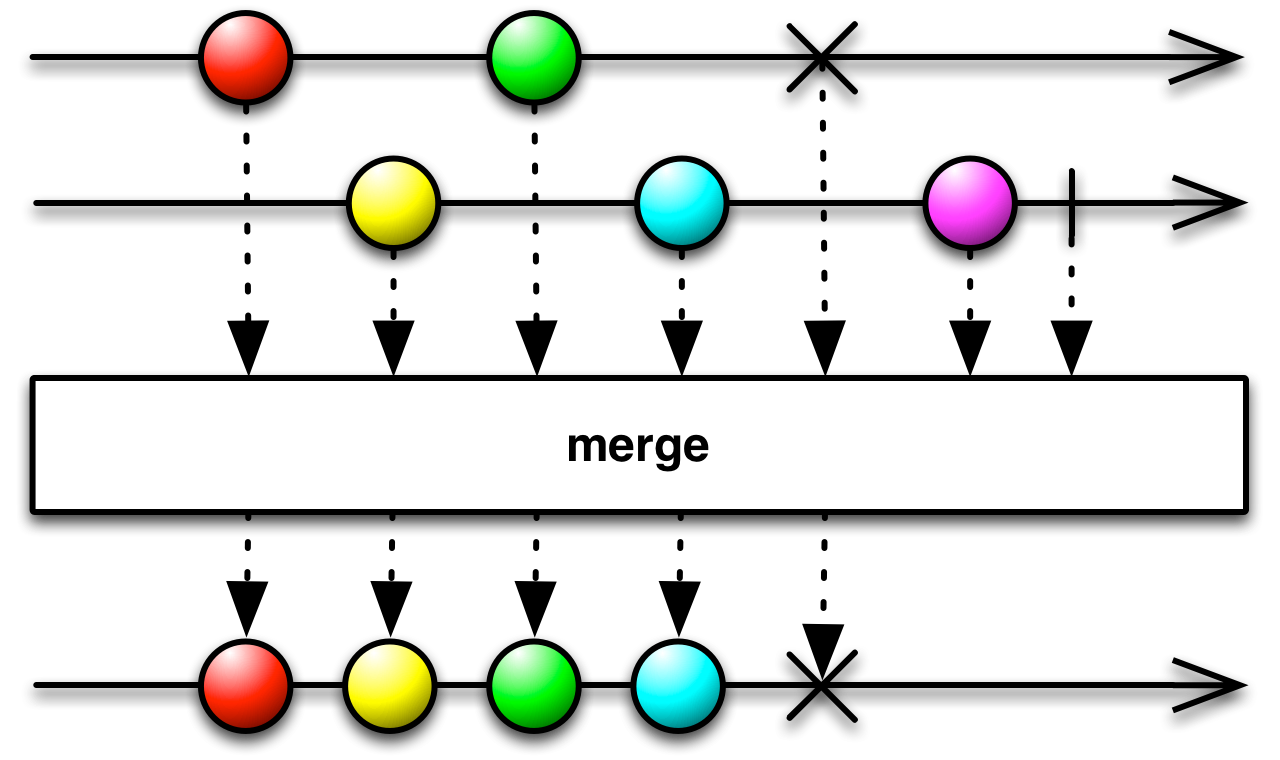 *
*
* You can combine the items emitted by multiple Observables so that they appear as a single Observable, by
* using the {@code merge} method.
*
* - Scheduler:
* - {@code merge} does not operate by default on a particular {@link Scheduler}.
*
*
* @param sequences
* the Iterable of Observables
* @return an Observable that emits items that are the result of flattening the items emitted by the
* Observables in the Iterable
* @see RxJava wiki: merge
*/
public final static Observable merge(Iterable> sequences) {
return merge(from(sequences));
}
/**
* Flattens an Iterable of Observables into one Observable, without any transformation, while limiting the
* number of concurrent subscriptions to these Observables.
*
*  *
*
* You can combine the items emitted by multiple Observables so that they appear as a single Observable, by
* using the {@code merge} method.
*
* - Scheduler:
* - {@code merge} does not operate by default on a particular {@link Scheduler}.
*
*
* @param sequences
* the Iterable of Observables
* @param maxConcurrent
* the maximum number of Observables that may be subscribed to concurrently
* @return an Observable that emits items that are the result of flattening the items emitted by the
* Observables in the Iterable
* @throws IllegalArgumentException
* if {@code maxConcurrent} is less than or equal to 0
* @see RxJava wiki: merge
*/
public final static Observable merge(Iterable> sequences, int maxConcurrent) {
return merge(from(sequences), maxConcurrent);
}
/**
* Flattens an Observable that emits Observables into a single Observable that emits the items emitted by
* those Observables, without any transformation.
*
* 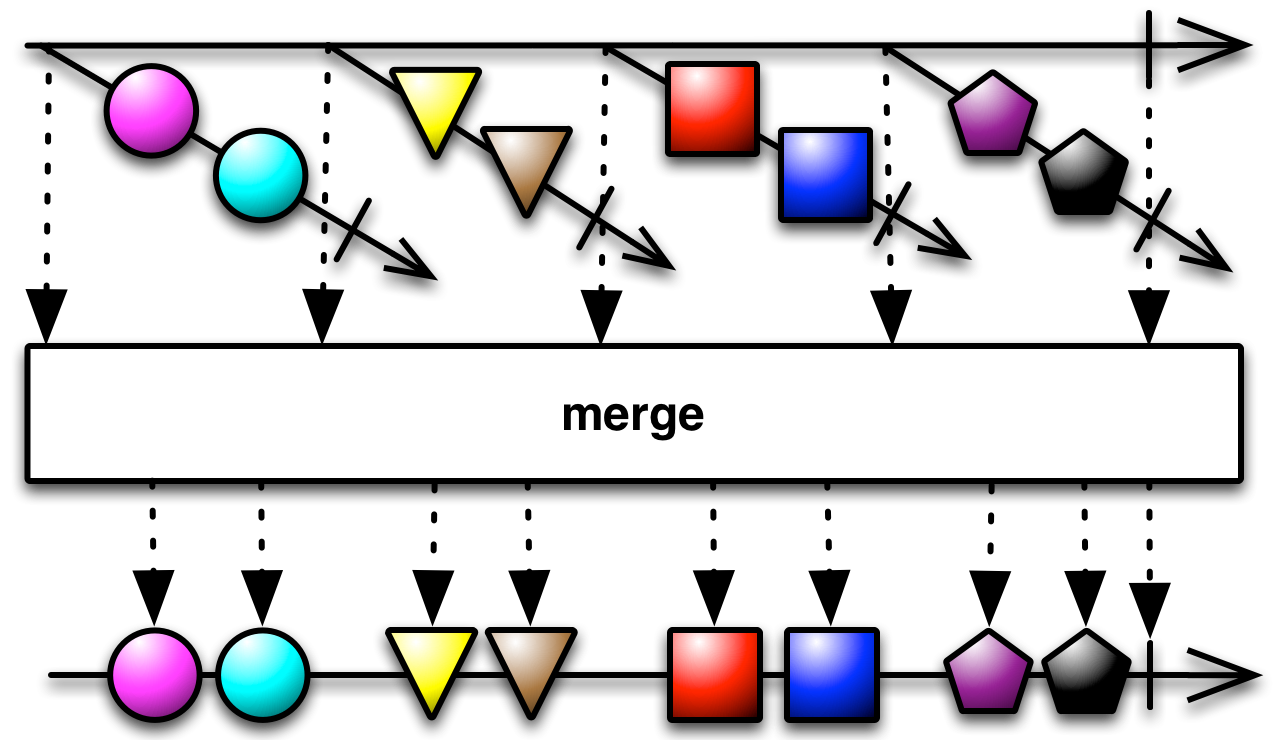 *
*
* You can combine the items emitted by multiple Observables so that they appear as a single Observable, by
* using the {@code merge} method.
*
* - Scheduler:
* - {@code merge} does not operate by default on a particular {@link Scheduler}.
*
*
* @param source
* an Observable that emits Observables
* @return an Observable that emits items that are the result of flattening the Observables emitted by the
* {@code source} Observable
* @see RxJava wiki: merge
*/
public final static Observable merge(Observable> source) {
return source.lift(new OperatorMerge());
}
/**
* Flattens an Observable that emits Observables into a single Observable that emits the items emitted by
* those Observables, without any transformation, while limiting the maximum number of concurrent
* subscriptions to these Observables.
*
*  *
*
* You can combine the items emitted by multiple Observables so that they appear as a single Observable, by
* using the {@code merge} method.
*
* - Scheduler:
* - {@code merge} does not operate by default on a particular {@link Scheduler}.
*
*
* @param source
* an Observable that emits Observables
* @param maxConcurrent
* the maximum number of Observables that may be subscribed to concurrently
* @return an Observable that emits items that are the result of flattening the Observables emitted by the
* {@code source} Observable
* @throws IllegalArgumentException
* if {@code maxConcurrent} is less than or equal to 0
* @see RxJava wiki: merge
*/
public final static Observable merge(Observable> source, int maxConcurrent) {
return source.lift(new OperatorMergeMaxConcurrent(maxConcurrent));
}
/**
* Flattens two Observables into a single Observable, without any transformation.
*
*  *
*
* You can combine items emitted by multiple Observables so that they appear as a single Observable, by
* using the {@code merge} method.
*
* - Scheduler:
* - {@code merge} does not operate by default on a particular {@link Scheduler}.
*
*
* @param t1
* an Observable to be merged
* @param t2
* an Observable to be merged
* @return an Observable that emits all of the items emitted by the source Observables
* @see RxJava wiki: merge
*/
@SuppressWarnings("unchecked")
public final static Observable merge(Observable t1, Observable t2) {
return merge(from(Arrays.asList(t1, t2)));
}
/**
* Flattens three Observables into a single Observable, without any transformation.
*
*  *
*
* You can combine items emitted by multiple Observables so that they appear as a single Observable, by
* using the {@code merge} method.
*
* - Scheduler:
* - {@code merge} does not operate by default on a particular {@link Scheduler}.
*
*
* @param t1
* an Observable to be merged
* @param t2
* an Observable to be merged
* @param t3
* an Observable to be merged
* @return an Observable that emits all of the items emitted by the source Observables
* @see RxJava wiki: merge
*/
@SuppressWarnings("unchecked")
public final static Observable merge(Observable t1, Observable t2, Observable t3) {
return merge(from(Arrays.asList(t1, t2, t3)));
}
/**
* Flattens four Observables into a single Observable, without any transformation.
*
*  *
*
* You can combine items emitted by multiple Observables so that they appear as a single Observable, by
* using the {@code merge} method.
*
* - Scheduler:
* - {@code merge} does not operate by default on a particular {@link Scheduler}.
*
*
* @param t1
* an Observable to be merged
* @param t2
* an Observable to be merged
* @param t3
* an Observable to be merged
* @param t4
* an Observable to be merged
* @return an Observable that emits all of the items emitted by the source Observables
* @see RxJava wiki: merge
*/
@SuppressWarnings("unchecked")
public final static Observable merge(Observable t1, Observable t2, Observable t3, Observable t4) {
return merge(from(Arrays.asList(t1, t2, t3, t4)));
}
/**
* Flattens five Observables into a single Observable, without any transformation.
*
*  *
*
* You can combine items emitted by multiple Observables so that they appear as a single Observable, by
* using the {@code merge} method.
*
* - Scheduler:
* - {@code merge} does not operate by default on a particular {@link Scheduler}.
*
*
* @param t1
* an Observable to be merged
* @param t2
* an Observable to be merged
* @param t3
* an Observable to be merged
* @param t4
* an Observable to be merged
* @param t5
* an Observable to be merged
* @return an Observable that emits all of the items emitted by the source Observables
* @see RxJava wiki: merge
*/
@SuppressWarnings("unchecked")
public final static Observable merge(Observable t1, Observable t2, Observable t3, Observable t4, Observable t5) {
return merge(from(Arrays.asList(t1, t2, t3, t4, t5)));
}
/**
* Flattens six Observables into a single Observable, without any transformation.
*
*  *
*
* You can combine items emitted by multiple Observables so that they appear as a single Observable, by
* using the {@code merge} method.
*
* - Scheduler:
* - {@code merge} does not operate by default on a particular {@link Scheduler}.
*
*
* @param t1
* an Observable to be merged
* @param t2
* an Observable to be merged
* @param t3
* an Observable to be merged
* @param t4
* an Observable to be merged
* @param t5
* an Observable to be merged
* @param t6
* an Observable to be merged
* @return an Observable that emits all of the items emitted by the source Observables
* @see RxJava wiki: merge
*/
@SuppressWarnings("unchecked")
public final static Observable merge(Observable t1, Observable t2, Observable t3, Observable t4, Observable t5, Observable t6) {
return merge(from(Arrays.asList(t1, t2, t3, t4, t5, t6)));
}
/**
* Flattens seven Observables into a single Observable, without any transformation.
*
*  *
*
* You can combine items emitted by multiple Observables so that they appear as a single Observable, by
* using the {@code merge} method.
*
* - Scheduler:
* - {@code merge} does not operate by default on a particular {@link Scheduler}.
*
*
* @param t1
* an Observable to be merged
* @param t2
* an Observable to be merged
* @param t3
* an Observable to be merged
* @param t4
* an Observable to be merged
* @param t5
* an Observable to be merged
* @param t6
* an Observable to be merged
* @param t7
* an Observable to be merged
* @return an Observable that emits all of the items emitted by the source Observables
* @see RxJava wiki: merge
*/
@SuppressWarnings("unchecked")
public final static Observable merge(Observable t1, Observable t2, Observable t3, Observable t4, Observable t5, Observable t6, Observable t7) {
return merge(from(Arrays.asList(t1, t2, t3, t4, t5, t6, t7)));
}
/**
* Flattens eight Observables into a single Observable, without any transformation.
*
*  *
*
* You can combine items emitted by multiple Observables so that they appear as a single Observable, by
* using the {@code merge} method.
*
* - Scheduler:
* - {@code merge} does not operate by default on a particular {@link Scheduler}.
*
*
* @param t1
* an Observable to be merged
* @param t2
* an Observable to be merged
* @param t3
* an Observable to be merged
* @param t4
* an Observable to be merged
* @param t5
* an Observable to be merged
* @param t6
* an Observable to be merged
* @param t7
* an Observable to be merged
* @param t8
* an Observable to be merged
* @return an Observable that emits all of the items emitted by the source Observables
* @see RxJava wiki: merge
*/
@SuppressWarnings("unchecked")
public final static Observable merge(Observable t1, Observable t2, Observable t3, Observable t4, Observable t5, Observable t6, Observable t7, Observable t8) {
return merge(from(Arrays.asList(t1, t2, t3, t4, t5, t6, t7, t8)));
}
/**
* Flattens nine Observables into a single Observable, without any transformation.
*
*  *
*
* You can combine items emitted by multiple Observables so that they appear as a single Observable, by
* using the {@code merge} method.
*
* - Scheduler:
* - {@code merge} does not operate by default on a particular {@link Scheduler}.
*
*
* @param t1
* an Observable to be merged
* @param t2
* an Observable to be merged
* @param t3
* an Observable to be merged
* @param t4
* an Observable to be merged
* @param t5
* an Observable to be merged
* @param t6
* an Observable to be merged
* @param t7
* an Observable to be merged
* @param t8
* an Observable to be merged
* @param t9
* an Observable to be merged
* @return an Observable that emits all of the items emitted by the source Observables
* @see RxJava wiki: merge
*/
@SuppressWarnings("unchecked")
public final static Observable merge(Observable t1, Observable t2, Observable t3, Observable t4, Observable t5, Observable t6, Observable t7, Observable t8, Observable t9) {
return merge(from(Arrays.asList(t1, t2, t3, t4, t5, t6, t7, t8, t9)));
}
/**
* Flattens an Array of Observables into one Observable, without any transformation.
*
* 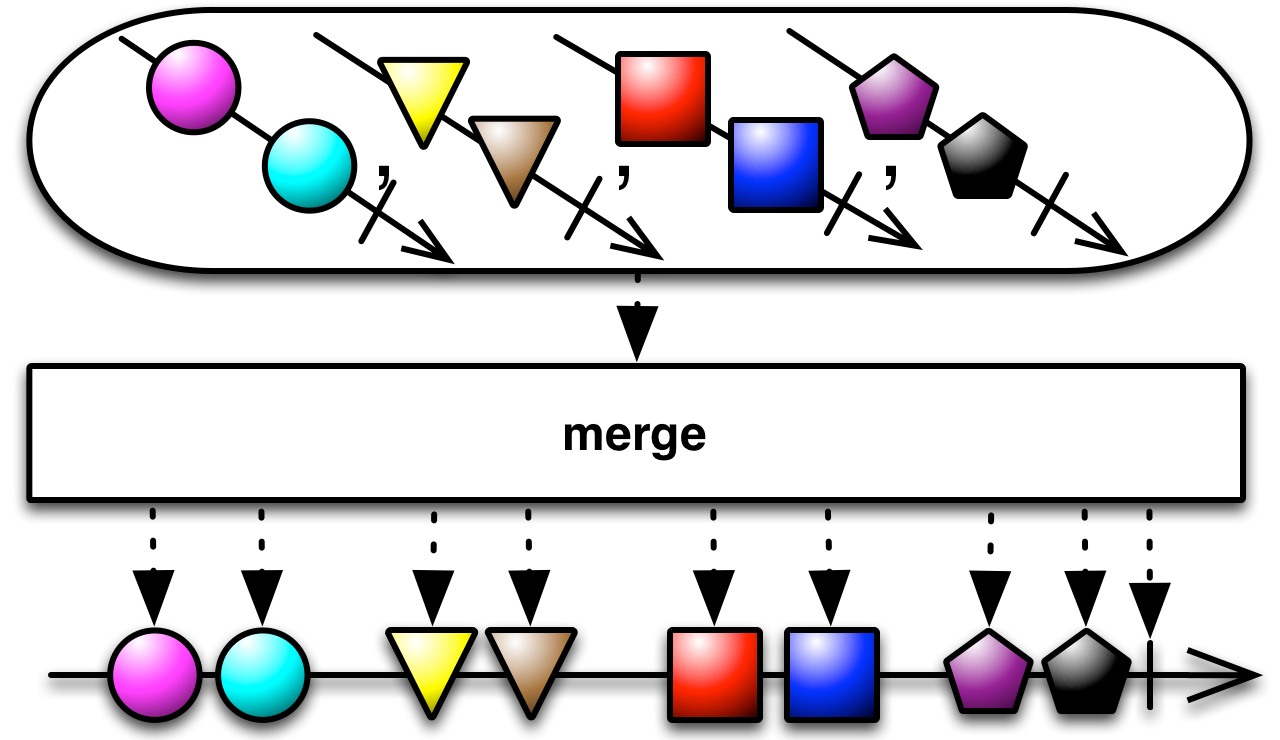 *
*
* You can combine items emitted by multiple Observables so that they appear as a single Observable, by
* using the {@code merge} method.
*
* - Scheduler:
* - {@code merge} does not operate by default on a particular {@link Scheduler}.
*
*
* @param sequences
* the Array of Observables
* @return an Observable that emits all of the items emitted by the Observables in the Array
* @see RxJava wiki: merge
*/
public final static Observable merge(Observable[] sequences) {
return merge(from(sequences));
}
/**
* Flattens an Observable that emits Observables into one Observable, in a way that allows an Observer to
* receive all successfully emitted items from all of the source Observables without being interrupted by
* an error notification from one of them.
*
* This behaves like {@link #merge(Observable)} except that if any of the merged Observables notify of an
* error via {@link Observer#onError onError}, {@code mergeDelayError} will refrain from propagating that
* error notification until all of the merged Observables have finished emitting items.
*
* 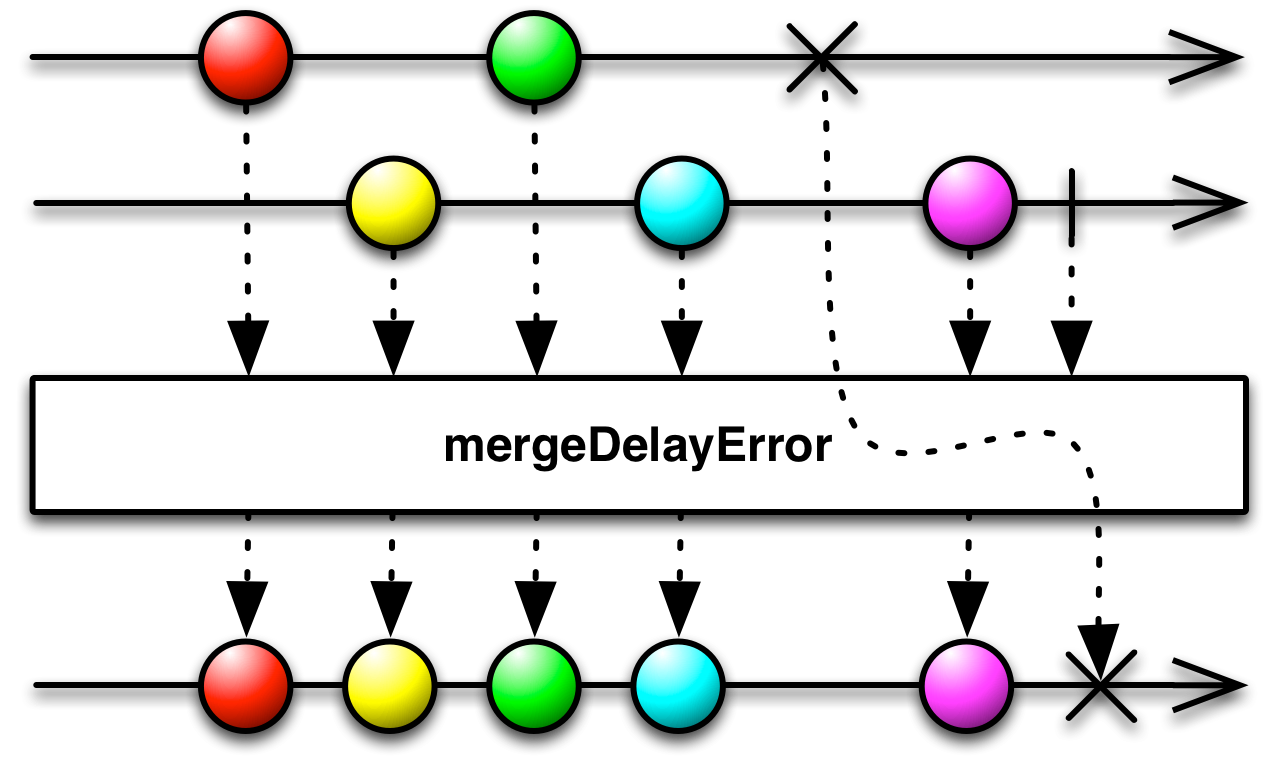 *
*
* Even if multiple merged Observables send {@code onError} notifications, {@code mergeDelayError} will only
* invoke the {@code onError} method of its Observers once.
*
* - Scheduler:
* - {@code mergeDelayError} does not operate by default on a particular {@link Scheduler}.
*
*
* @param source
* an Observable that emits Observables
* @return an Observable that emits all of the items emitted by the Observables emitted by the
* {@code source} Observable
* @see RxJava wiki: mergeDelayError
*/
public final static Observable mergeDelayError(Observable> source) {
return source.lift(new OperatorMergeDelayError());
}
/**
* Flattens two Observables into one Observable, in a way that allows an Observer to receive all
* successfully emitted items from each of the source Observables without being interrupted by an error
* notification from one of them.
*
* This behaves like {@link #merge(Observable, Observable)} except that if any of the merged Observables
* notify of an error via {@link Observer#onError onError}, {@code mergeDelayError} will refrain from
* propagating that error notification until all of the merged Observables have finished emitting items.
*
*  *
*
* Even if both merged Observables send {@code onError} notifications, {@code mergeDelayError} will only
* invoke the {@code onError} method of its Observers once.
*
* - Scheduler:
* - {@code mergeDelayError} does not operate by default on a particular {@link Scheduler}.
*
*
* @param t1
* an Observable to be merged
* @param t2
* an Observable to be merged
* @return an Observable that emits all of the items that are emitted by the two source Observables
* @see RxJava wiki: mergeDelayError
*/
public final static Observable mergeDelayError(Observable t1, Observable t2) {
return mergeDelayError(just(t1, t2));
}
/**
* Flattens three Observables into one Observable, in a way that allows an Observer to receive all
* successfully emitted items from all of the source Observables without being interrupted by an error
* notification from one of them.
*
* This behaves like {@link #merge(Observable, Observable, Observable)} except that if any of the merged
* Observables notify of an error via {@link Observer#onError onError}, {@code mergeDelayError} will refrain
* from propagating that error notification until all of the merged Observables have finished emitting
* items.
*
*  *
*
* Even if multiple merged Observables send {@code onError} notifications, {@code mergeDelayError} will only
* invoke the {@code onError} method of its Observers once.
*
* - Scheduler:
* - {@code mergeDelayError} does not operate by default on a particular {@link Scheduler}.
*
*
* @param t1
* an Observable to be merged
* @param t2
* an Observable to be merged
* @param t3
* an Observable to be merged
* @return an Observable that emits all of the items that are emitted by the source Observables
* @see RxJava wiki: mergeDelayError
*/
public final static Observable mergeDelayError(Observable t1, Observable t2, Observable t3) {
return mergeDelayError(just(t1, t2, t3));
}
/**
* Flattens four Observables into one Observable, in a way that allows an Observer to receive all
* successfully emitted items from all of the source Observables without being interrupted by an error
* notification from one of them.
*
* This behaves like {@link #merge(Observable, Observable, Observable, Observable)} except that if any of
* the merged Observables notify of an error via {@link Observer#onError onError}, {@code mergeDelayError}
* will refrain from propagating that error notification until all of the merged Observables have finished
* emitting items.
*
*  *
*
* Even if multiple merged Observables send {@code onError} notifications, {@code mergeDelayError} will only
* invoke the {@code onError} method of its Observers once.
*
* - Scheduler:
* - {@code mergeDelayError} does not operate by default on a particular {@link Scheduler}.
*
*
* @param t1
* an Observable to be merged
* @param t2
* an Observable to be merged
* @param t3
* an Observable to be merged
* @param t4
* an Observable to be merged
* @return an Observable that emits all of the items that are emitted by the source Observables
* @see RxJava wiki: mergeDelayError
*/
public final static Observable mergeDelayError(Observable t1, Observable t2, Observable t3, Observable t4) {
return mergeDelayError(just(t1, t2, t3, t4));
}
/**
* Flattens five Observables into one Observable, in a way that allows an Observer to receive all
* successfully emitted items from all of the source Observables without being interrupted by an error
* notification from one of them.
*
* This behaves like {@link #merge(Observable, Observable, Observable, Observable, Observable)} except that
* if any of the merged Observables notify of an error via {@link Observer#onError onError},
* {@code mergeDelayError} will refrain from propagating that error notification until all of the merged
* Observables have finished emitting items.
*
*  *
*
* Even if multiple merged Observables send {@code onError} notifications, {@code mergeDelayError} will only
* invoke the {@code onError} method of its Observers once.
*
* - Scheduler:
* - {@code mergeDelayError} does not operate by default on a particular {@link Scheduler}.
*
*
* @param t1
* an Observable to be merged
* @param t2
* an Observable to be merged
* @param t3
* an Observable to be merged
* @param t4
* an Observable to be merged
* @param t5
* an Observable to be merged
* @return an Observable that emits all of the items that are emitted by the source Observables
* @see RxJava wiki: mergeDelayError
*/
public final static Observable mergeDelayError(Observable t1, Observable t2, Observable t3, Observable t4, Observable t5) {
return mergeDelayError(just(t1, t2, t3, t4, t5));
}
/**
* Flattens six Observables into one Observable, in a way that allows an Observer to receive all
* successfully emitted items from all of the source Observables without being interrupted by an error
* notification from one of them.
*
* This behaves like {@link #merge(Observable, Observable, Observable, Observable, Observable, Observable)}
* except that if any of the merged Observables notify of an error via {@link Observer#onError onError},
* {@code mergeDelayError} will refrain from propagating that error notification until all of the merged
* Observables have finished emitting items.
*
*  *
*
* Even if multiple merged Observables send {@code onError} notifications, {@code mergeDelayError} will only
* invoke the {@code onError} method of its Observers once.
*
* - Scheduler:
* - {@code mergeDelayError} does not operate by default on a particular {@link Scheduler}.
*
*
* @param t1
* an Observable to be merged
* @param t2
* an Observable to be merged
* @param t3
* an Observable to be merged
* @param t4
* an Observable to be merged
* @param t5
* an Observable to be merged
* @param t6
* an Observable to be merged
* @return an Observable that emits all of the items that are emitted by the source Observables
* @see RxJava wiki: mergeDelayError
*/
public final static Observable mergeDelayError(Observable t1, Observable t2, Observable t3, Observable t4, Observable t5, Observable t6) {
return mergeDelayError(just(t1, t2, t3, t4, t5, t6));
}
/**
* Flattens seven Observables into one Observable, in a way that allows an Observer to receive all
* successfully emitted items from all of the source Observables without being interrupted by an error
* notification from one of them.
*
* This behaves like
* {@link #merge(Observable, Observable, Observable, Observable, Observable, Observable, Observable)}
* except that if any of the merged Observables notify of an error via {@link Observer#onError onError},
* {@code mergeDelayError} will refrain from propagating that error notification until all of the merged
* Observables have finished emitting items.
*
*  *
*
* Even if multiple merged Observables send {@code onError} notifications, {@code mergeDelayError} will only
* invoke the {@code onError} method of its Observers once.
*
* - Scheduler:
* - {@code mergeDelayError} does not operate by default on a particular {@link Scheduler}.
*
*
* @param t1
* an Observable to be merged
* @param t2
* an Observable to be merged
* @param t3
* an Observable to be merged
* @param t4
* an Observable to be merged
* @param t5
* an Observable to be merged
* @param t6
* an Observable to be merged
* @param t7
* an Observable to be merged
* @return an Observable that emits all of the items that are emitted by the source Observables
* @see RxJava wiki: mergeDelayError
*/
public final static Observable mergeDelayError(Observable t1, Observable t2, Observable t3, Observable t4, Observable t5, Observable t6, Observable t7) {
return mergeDelayError(just(t1, t2, t3, t4, t5, t6, t7));
}
/**
* Flattens eight Observables into one Observable, in a way that allows an Observer to receive all
* successfully emitted items from all of the source Observables without being interrupted by an error
* notification from one of them.
*
* This behaves like {@link #merge(Observable, Observable, Observable, Observable, Observable, Observable, Observable, Observable)}
* except that if any of the merged Observables notify of an error via {@link Observer#onError onError},
* {@code mergeDelayError} will refrain from propagating that error notification until all of the merged
* Observables have finished emitting items.
*
*  *
*
* Even if multiple merged Observables send {@code onError} notifications, {@code mergeDelayError} will only
* invoke the {@code onError} method of its Observers once.
*
* - Scheduler:
* - {@code mergeDelayError} does not operate by default on a particular {@link Scheduler}.
*
*
* @param t1
* an Observable to be merged
* @param t2
* an Observable to be merged
* @param t3
* an Observable to be merged
* @param t4
* an Observable to be merged
* @param t5
* an Observable to be merged
* @param t6
* an Observable to be merged
* @param t7
* an Observable to be merged
* @param t8
* an Observable to be merged
* @return an Observable that emits all of the items that are emitted by the source Observables
* @see RxJava wiki: mergeDelayError
*/
// suppress because the types are checked by the method signature before using a vararg
public final static Observable mergeDelayError(Observable t1, Observable t2, Observable t3, Observable t4, Observable t5, Observable t6, Observable t7, Observable t8) {
return mergeDelayError(just(t1, t2, t3, t4, t5, t6, t7, t8));
}
/**
* Flattens nine Observables into one Observable, in a way that allows an Observer to receive all
* successfully emitted items from all of the source Observables without being interrupted by an error
* notification from one of them.
*
* This behaves like {@link #merge(Observable, Observable, Observable, Observable, Observable, Observable, Observable, Observable, Observable)}
* except that if any of the merged Observables notify of an error via {@link Observer#onError onError},
* {@code mergeDelayError} will refrain from propagating that error notification until all of the merged
* Observables have finished emitting items.
*
*  *
*
* Even if multiple merged Observables send {@code onError} notifications, {@code mergeDelayError} will only
* invoke the {@code onError} method of its Observers once.
*
* - Scheduler:
* - {@code mergeDelayError} does not operate by default on a particular {@link Scheduler}.
*
*
* @param t1
* an Observable to be merged
* @param t2
* an Observable to be merged
* @param t3
* an Observable to be merged
* @param t4
* an Observable to be merged
* @param t5
* an Observable to be merged
* @param t6
* an Observable to be merged
* @param t7
* an Observable to be merged
* @param t8
* an Observable to be merged
* @param t9
* an Observable to be merged
* @return an Observable that emits all of the items that are emitted by the source Observables
* @see RxJava wiki: mergeDelayError
*/
public final static Observable mergeDelayError(Observable t1, Observable t2, Observable t3, Observable t4, Observable t5, Observable t6, Observable t7, Observable t8, Observable t9) {
return mergeDelayError(just(t1, t2, t3, t4, t5, t6, t7, t8, t9));
}
/**
* Converts the source {@code Observable} into an {@code Observable>} that emits the
* source Observable as its single emission.
*
*  *
*
* - Scheduler:
* - {@code nest} does not operate by default on a particular {@link Scheduler}.
*
*
* @return an Observable that emits a single item: the source Observable
*/
public final Observable> nest() {
return just(this);
}
/**
* Returns an Observable that never sends any items or notifications to an {@link Observer}.
*
*  *
*
* This Observable is useful primarily for testing purposes.
*
* - Scheduler:
* - {@code never} does not operate by default on a particular {@link Scheduler}.
*
*
* @param
* the type of items (not) emitted by the Observable
* @return an Observable that never emits any items or sends any notifications to an {@link Observer}
* @see RxJava wiki: never
*/
public final static Observable never() {
return new NeverObservable();
}
/**
* Returns an Observable that emits a sequence of Integers within a specified range.
*
*  *
*
* - Scheduler:
* - {@code range} does not operate by default on a particular {@link Scheduler}.
*
*
* @param start
* the value of the first Integer in the sequence
* @param count
* the number of sequential Integers to generate
* @return an Observable that emits a range of sequential Integers
* @throws IllegalArgumentException
* if {@code count} is less than zero, or if {@code start} + {@code count} − 1 exceeds
* {@code Integer.MAX_VALUE}
* @see RxJava wiki: range
*/
public final static Observable range(int start, int count) {
if (count < 0) {
throw new IllegalArgumentException("Count can not be negative");
}
if (count == 0) {
return Observable.empty();
}
if (start > Integer.MAX_VALUE - count + 1) {
throw new IllegalArgumentException("start + count can not exceed Integer.MAX_VALUE");
}
if(count == 1) {
return Observable.just(start);
}
return Observable.create(new OnSubscribeRange(start, start + (count - 1)));
}
/**
* Returns an Observable that emits a sequence of Integers within a specified range, on a specified
* Scheduler.
*
*  *
*
* - Scheduler:
* - you specify which {@link Scheduler} this operator will use
*
*
* @param start
* the value of the first Integer in the sequence
* @param count
* the number of sequential Integers to generate
* @param scheduler
* the Scheduler to run the generator loop on
* @return an Observable that emits a range of sequential Integers
* @see RxJava wiki: range
*/
public final static Observable range(int start, int count, Scheduler scheduler) {
return range(start, count).subscribeOn(scheduler);
}
/**
* Returns an Observable that emits a Boolean value that indicates whether two Observable sequences are the
* same by comparing the items emitted by each Observable pairwise.
*
* 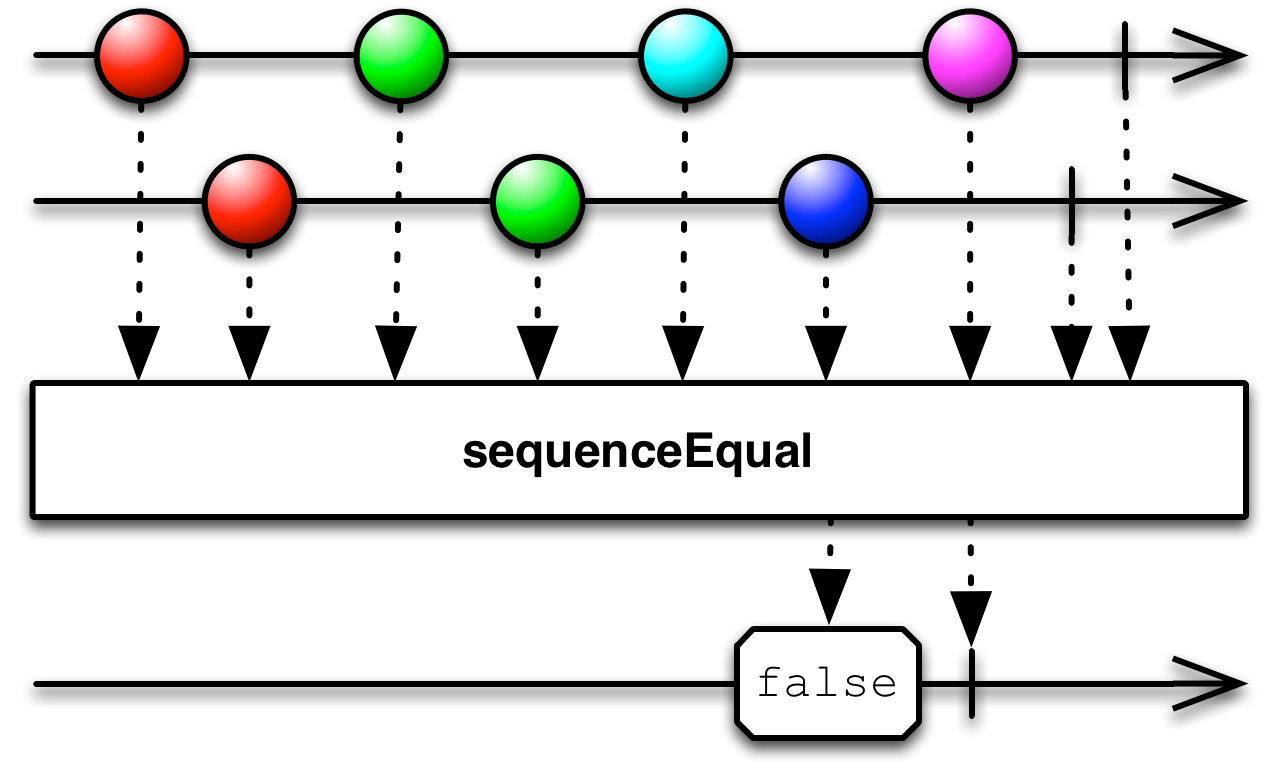 *
*
* - Scheduler:
* - {@code sequenceEqual} does not operate by default on a particular {@link Scheduler}.
*
*
* @param first
* the first Observable to compare
* @param second
* the second Observable to compare
* @param
* the type of items emitted by each Observable
* @return an Observable that emits a Boolean value that indicates whether the two sequences are the same
* @see RxJava wiki: sequenceEqual
*/
public final static Observable sequenceEqual(Observable first, Observable second) {
return sequenceEqual(first, second, new Func2() {
@Override
public final Boolean call(T first, T second) {
if (first == null) {
return second == null;
}
return first.equals(second);
}
});
}
/**
* Returns an Observable that emits a Boolean value that indicates whether two Observable sequences are the
* same by comparing the items emitted by each Observable pairwise based on the results of a specified
* equality function.
*
*  *
*
* - Scheduler:
* - {@code sequenceEqual} does not operate by default on a particular {@link Scheduler}.
*
*
* @param first
* the first Observable to compare
* @param second
* the second Observable to compare
* @param equality
* a function used to compare items emitted by each Observable
* @param
* the type of items emitted by each Observable
* @return an Observable that emits a Boolean value that indicates whether the two Observable two sequences
* are the same according to the specified function
* @see RxJava wiki: sequenceEqual
*/
public final static Observable sequenceEqual(Observable first, Observable second, Func2 equality) {
return OperatorSequenceEqual.sequenceEqual(first, second, equality);
}
/**
* Converts an Observable that emits Observables into an Observable that emits the items emitted by the
* most recently emitted of those Observables.
*
*  *
*
* {@code switchOnNext} subscribes to an Observable that emits Observables. Each time it observes one of
* these emitted Observables, the Observable returned by {@code switchOnNext} begins emitting the items
* emitted by that Observable. When a new Observable is emitted, {@code switchOnNext} stops emitting items
* from the earlier-emitted Observable and begins emitting items from the new one.
*
* - Scheduler:
* - {@code switchOnNext} does not operate by default on a particular {@link Scheduler}.
*
*
* @param the item type
* @param sequenceOfSequences
* the source Observable that emits Observables
* @return an Observable that emits the items emitted by the Observable most recently emitted by the source
* Observable
* @see RxJava wiki: switchOnNext
*/
public final static Observable switchOnNext(Observable> sequenceOfSequences) {
return sequenceOfSequences.lift(new OperatorSwitch());
}
/**
* Returns an Observable that emits a {@code 0L} after the {@code initialDelay} and ever increasing numbers
* after each {@code period} of time thereafter.
*
*  *
*
* - Backpressure Support:
* - This operator does not support backpressure as it uses time. If the downstream needs a slower rate
* it should slow the timer or use something like {@link #onBackpressureDrop}.
* - Scheduler:
* - {@code timer} operates by default on the {@code computation} {@link Scheduler}.
*
*
* @param initialDelay
* the initial delay time to wait before emitting the first value of 0L
* @param period
* the period of time between emissions of the subsequent numbers
* @param unit
* the time unit for both {@code initialDelay} and {@code period}
* @return an Observable that emits a 0L after the {@code initialDelay} and ever increasing numbers after
* each {@code period} of time thereafter
* @see RxJava wiki: timer
*/
public final static Observable timer(long initialDelay, long period, TimeUnit unit) {
return timer(initialDelay, period, unit, Schedulers.computation());
}
/**
* Returns an Observable that emits a {@code 0L} after the {@code initialDelay} and ever increasing numbers
* after each {@code period} of time thereafter, on a specified {@link Scheduler}.
*
*  *
*
* - Backpressure Support:
* - This operator does not support backpressure as it uses time. If the downstream needs a slower rate
* it should slow the timer or use something like {@link #onBackpressureDrop}.
* - Scheduler:
* - you specify which {@link Scheduler} this operator will use
*
*
* @param initialDelay
* the initial delay time to wait before emitting the first value of 0L
* @param period
* the period of time between emissions of the subsequent numbers
* @param unit
* the time unit for both {@code initialDelay} and {@code period}
* @param scheduler
* the Scheduler on which the waiting happens and items are emitted
* @return an Observable that emits a 0L after the {@code initialDelay} and ever increasing numbers after
* each {@code period} of time thereafter, while running on the given Scheduler
* @see RxJava wiki: timer
*/
public final static Observable timer(long initialDelay, long period, TimeUnit unit, Scheduler scheduler) {
return create(new OnSubscribeTimerPeriodically(initialDelay, period, unit, scheduler));
}
/**
* Returns an Observable that emits one item after a specified delay, and then completes.
*
*  *
*
* - Backpressure Support:
* - This operator does not support backpressure as it uses time. If the downstream needs a slower rate
* it should slow the timer or use something like {@link #onBackpressureDrop}.
* - Scheduler:
* - {@code timer} operates by default on the {@code computation} {@link Scheduler}.
*
*
* @param delay
* the initial delay before emitting a single {@code 0L}
* @param unit
* time units to use for {@code delay}
* @return an Observable that emits one item after a specified delay, and then completes
* @see RxJava wiki: timer
*/
public final static Observable timer(long delay, TimeUnit unit) {
return timer(delay, unit, Schedulers.computation());
}
/**
* Returns an Observable that emits one item after a specified delay, on a specified Scheduler, and then
* completes.
*
*  *
*
* - Backpressure Support:
* - This operator does not support backpressure as it uses time. If the downstream needs a slower rate
* it should slow the timer or use something like {@link #onBackpressureDrop}.
* - Scheduler:
* - you specify which {@link Scheduler} this operator will use
*
*
* @param delay
* the initial delay before emitting a single 0L
* @param unit
* time units to use for {@code delay}
* @param scheduler
* the {@link Scheduler} to use for scheduling the item
* @return an Observable that emits one item after a specified delay, on a specified Scheduler, and then
* completes
* @see RxJava wiki: timer
*/
public final static Observable timer(long delay, TimeUnit unit, Scheduler scheduler) {
return create(new OnSubscribeTimerOnce(delay, unit, scheduler));
}
/**
* Constructs an Observable that creates a dependent resource object.
*
* 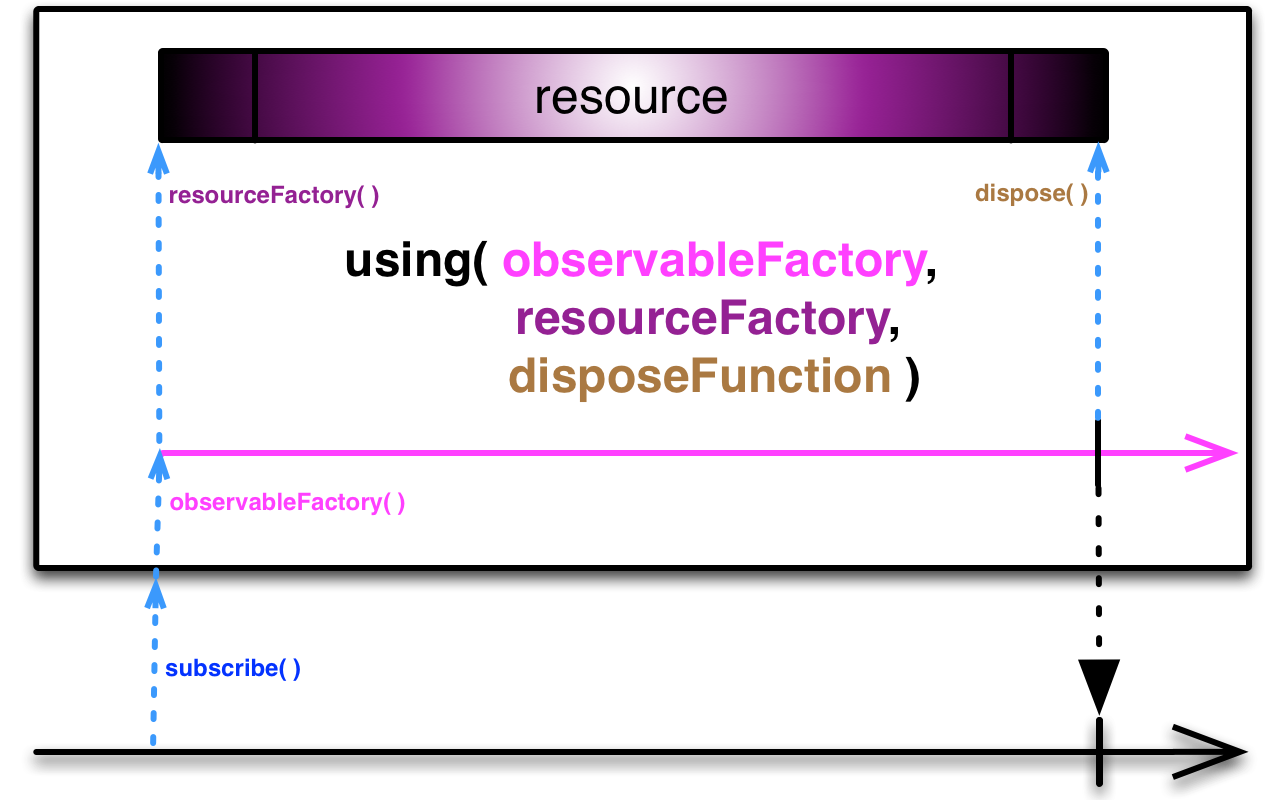 *
*
* - Scheduler:
* - {@code using} does not operate by default on a particular {@link Scheduler}.
*
*
* @param resourceFactory
* the factory function to create a resource object that depends on the Observable
* @param observableFactory
* the factory function to create an Observable
* @param disposeAction
* the function that will dispose of the resource
* @return the Observable whose lifetime controls the lifetime of the dependent resource object
* @see RxJava wiki: using
*/
public final static Observable using(
final Func0 resourceFactory,
final Func1> observableFactory,
final Action1 disposeAction) {
return create(new OnSubscribeUsing(resourceFactory, observableFactory, disposeAction));
}
/**
* Returns an Observable that emits the results of a specified combiner function applied to combinations of
* items emitted, in sequence, by an Iterable of other Observables.
*
* {@code zip} applies this function in strict sequence, so the first item emitted by the new Observable
* will be the result of the function applied to the first item emitted by each of the source Observables;
* the second item emitted by the new Observable will be the result of the function applied to the second
* item emitted by each of those Observables; and so forth.
*
* The resulting {@code Observable} returned from {@code zip} will invoke {@code onNext} as many times as
* the number of {@code onNext} invokations of the source Observable that emits the fewest items.
*
*  *
*
* - Scheduler:
* - {@code zip} does not operate by default on a particular {@link Scheduler}.
*
*
* @param ws
* an Iterable of source Observables
* @param zipFunction
* a function that, when applied to an item emitted by each of the source Observables, results in
* an item that will be emitted by the resulting Observable
* @return an Observable that emits the zipped results
* @see RxJava wiki: zip
*/
public final static Observable zip(Iterable> ws, FuncN zipFunction) {
List> os = new ArrayList>();
for (Observable o : ws) {
os.add(o);
}
return Observable.just(os.toArray(new Observable[os.size()])).lift(new OperatorZip(zipFunction));
}
/**
* Returns an Observable that emits the results of a specified combiner function applied to combinations of
* n items emitted, in sequence, by the n Observables emitted by a specified Observable.
*
* {@code zip} applies this function in strict sequence, so the first item emitted by the new Observable
* will be the result of the function applied to the first item emitted by each of the Observables emitted
* by the source Observable; the second item emitted by the new Observable will be the result of the
* function applied to the second item emitted by each of those Observables; and so forth.
*
* The resulting {@code Observable} returned from {@code zip} will invoke {@code onNext} as many times as
* the number of {@code onNext} invokations of the source Observable that emits the fewest items.
*
* 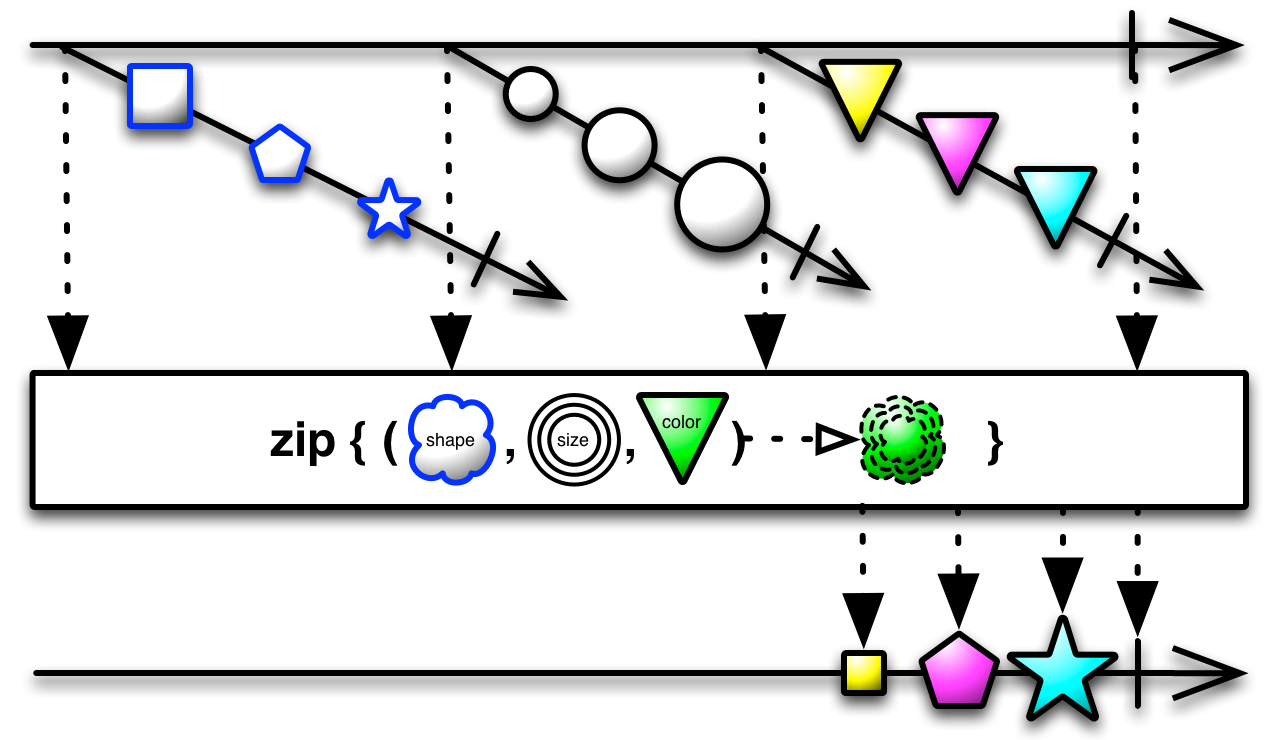 *
*
* - Scheduler:
* - {@code zip} does not operate by default on a particular {@link Scheduler}.
*
*
* @param ws
* an Observable of source Observables
* @param zipFunction
* a function that, when applied to an item emitted by each of the Observables emitted by
* {@code ws}, results in an item that will be emitted by the resulting Observable
* @return an Observable that emits the zipped results
* @see RxJava wiki: zip
*/
public final static Observable zip(Observable> ws, final FuncN zipFunction) {
return ws.toList().map(new Func1>, Observable[]>() {
@Override
public Observable[] call(List> o) {
return o.toArray(new Observable[o.size()]);
}
}).lift(new OperatorZip(zipFunction));
}
/**
* Returns an Observable that emits the results of a specified combiner function applied to combinations of
* two items emitted, in sequence, by two other Observables.
*
*  *
*
* {@code zip} applies this function in strict sequence, so the first item emitted by the new Observable
* will be the result of the function applied to the first item emitted by {@code o1} and the first item
* emitted by {@code o2}; the second item emitted by the new Observable will be the result of the function
* applied to the second item emitted by {@code o1} and the second item emitted by {@code o2}; and so forth.
*
* The resulting {@code Observable} returned from {@code zip} will invoke {@link Observer#onNext onNext}
* as many times as the number of {@code onNext} invocations of the source Observable that emits the fewest
* items.
*
* - Scheduler:
* - {@code zip} does not operate by default on a particular {@link Scheduler}.
*
*
* @param o1
* the first source Observable
* @param o2
* a second source Observable
* @param zipFunction
* a function that, when applied to an item emitted by each of the source Observables, results
* in an item that will be emitted by the resulting Observable
* @return an Observable that emits the zipped results
* @see RxJava wiki: zip
*/
public final static Observable zip(Observable o1, Observable o2, final Func2 zipFunction) {
return just(new Observable[] { o1, o2 }).lift(new OperatorZip(zipFunction));
}
/**
* Returns an Observable that emits the results of a specified combiner function applied to combinations of
* three items emitted, in sequence, by three other Observables.
*
*  *
*
* {@code zip} applies this function in strict sequence, so the first item emitted by the new Observable
* will be the result of the function applied to the first item emitted by {@code o1}, the first item
* emitted by {@code o2}, and the first item emitted by {@code o3}; the second item emitted by the new
* Observable will be the result of the function applied to the second item emitted by {@code o1}, the
* second item emitted by {@code o2}, and the second item emitted by {@code o3}; and so forth.
*
* The resulting {@code Observable} returned from {@code zip} will invoke {@link Observer#onNext onNext}
* as many times as the number of {@code onNext} invocations of the source Observable that emits the fewest
* items.
*
* - Scheduler:
* - {@code zip} does not operate by default on a particular {@link Scheduler}.
*
*
* @param o1
* the first source Observable
* @param o2
* a second source Observable
* @param o3
* a third source Observable
* @param zipFunction
* a function that, when applied to an item emitted by each of the source Observables, results in
* an item that will be emitted by the resulting Observable
* @return an Observable that emits the zipped results
* @see RxJava wiki: zip
*/
public final static Observable zip(Observable o1, Observable o2, Observable o3, Func3 zipFunction) {
return just(new Observable[] { o1, o2, o3 }).lift(new OperatorZip(zipFunction));
}
/**
* Returns an Observable that emits the results of a specified combiner function applied to combinations of
* four items emitted, in sequence, by four other Observables.
*
*  *
*
* {@code zip} applies this function in strict sequence, so the first item emitted by the new Observable
* will be the result of the function applied to the first item emitted by {@code o1}, the first item
* emitted by {@code o2}, the first item emitted by {@code o3}, and the first item emitted by {@code 04};
* the second item emitted by the new Observable will be the result of the function applied to the second
* item emitted by each of those Observables; and so forth.
*
* The resulting {@code Observable} returned from {@code zip} will invoke {@link Observer#onNext onNext}
* as many times as the number of {@code onNext} invocations of the source Observable that emits the fewest
* items.
*
* - Scheduler:
* - {@code zip} does not operate by default on a particular {@link Scheduler}.
*
*
* @param o1
* the first source Observable
* @param o2
* a second source Observable
* @param o3
* a third source Observable
* @param o4
* a fourth source Observable
* @param zipFunction
* a function that, when applied to an item emitted by each of the source Observables, results in
* an item that will be emitted by the resulting Observable
* @return an Observable that emits the zipped results
* @see RxJava wiki: zip
*/
public final static Observable zip(Observable o1, Observable o2, Observable o3, Observable o4, Func4 zipFunction) {
return just(new Observable[] { o1, o2, o3, o4 }).lift(new OperatorZip(zipFunction));
}
/**
* Returns an Observable that emits the results of a specified combiner function applied to combinations of
* five items emitted, in sequence, by five other Observables.
*
*